


Catherine Haughney, editor of Reader’s Digest, welcomes you to the October issue
Tell us what you think of this issue: theeditor@readersdigest.co.uk
Like us on Facebook: facebook.com/readersdigestuk
Follow us on twitter: twitter.com/rdigest




Catherine Haughney, editor of Reader’s Digest, welcomes you to the October issue
Tell us what you think of this issue: theeditor@readersdigest.co.uk
Like us on Facebook: facebook.com/readersdigestuk
Follow us on twitter: twitter.com/rdigest

“Working on James Brown’s article was fun,” says Laurie Hastings, an illustrator and printmaker. “I used inanimate objects—an old address book, a photo album, a mobile phone—to represent friends past and present.” p26

“Two Alzheimer’s research findings might change how the disease is treated— and perhaps prevented—in the future,” says writer and editor Anita Bartholomew. p44

“Tony Robinson was an engaging interviewee: unguarded, thoughtful and often very funny,” says journalist Ellie Rose. “And I never knew he liked dressing up in drag so much!” p78

How one doctor brought a new life to this little girl p68

What would you do if you found a wallet in the street? Try to return it to its owner—or treat the contents as a lucky “win”? We all like to think we’d do the right thing, but would we? To find out, we sent our reporters to 16 cities around the world. You can read the results of our fascinating survey on p60.
I’m thrilled to announce that our 100-Word Story Competition is back for a fourth year (see p41). Writing an engaging short story is one achievement, but using precisely 100 words is a real challenge. Best of luck to all our entrants—we really enjoy reading all your stories.
If you want a few tips on how to engage an audience, you could watch the new series of Downton Abbey. Penned by Julian Fellowes, the show has become a worldwide phenomenon. We look at the extraordinary cult of Downton on p30. Reader’s Digest








Send us your stories, jokes and letters—if we publish, we pay!

£50 for the star letter and £30 for regular letters. Email readersletters@readersdigest. co.uk or write to Readers’ Letters, Reader’s Digest, 57 Broadwick Street, London W1F 9QS £50 for the true stories, anecdotes, jokes in Laugh! and You Couldn’t Make It Up…, and contributions to end-of-article fillers, Travel and Gardening. Email excerpts@ readersdigest.co.uk or write to Excerpts, Reader’s Digest, 57 Broadwick Street, London W1F 9QS
SubScribe!

Visit readersdigest.co.uk or write to Reader’s Digest, PO Box 444, Douglas, Isle of Man IM99 3ZF.
UK: £45.48 a year. Republic of Ireland: €74.39 a year. Europe: £50 a year. Rest of the world: £60 a year. Prices include delivery. For Gift Subscriptions contact Customer Services below
cuStomer ServiceS talking magazineS
Contact Customer Services for renewals, gifts, address changes, payments, account information and all other enquiries. Phone: 0871 351 1000 (Calls from a BT landline will cost 10p a minute. Call costs from other providers may vary.) Email: customer_ service@readersdigest.co.uk Minicom: 0870 600 1153.
twitter.com/rdigest
Reader’s Digest is available in a talking edition for blind and partially sighted people for £16. For details, phone: 01435 866 102; email: info@ tnauk.org.uk, website: tnauk.org.uk.
Ensure submissions are not previously published. Include your name, email, address and daytime phone number with all correspondence. We may edit letters and use them in all print and electronic media. Contributions used become world copyright of Vivat Direct Ltd (t/a Reader’s Digest).
We cannot acknowledge or return unpublished items or unsolicited article-length manuscripts. Do not send SAEs. Articlelength stories, poetry and cartoons are not requested.
facebook.com/readersdigestukReadingTheDigest


web exclusive
Trying to shed a few pounds before Christmas?
Go to readersdigest. co.uk/magazine and take our weight-loss quiz—you’ll soon find out if you have what it takes to succeed. PLUS read our special feature —Easy Ways to Cut Calories During the Working Day. It’s all about the bottom line!
check out our fabulous apps, too! go to the App Store, iTunes music store, google Play Store and Amazon to download our magazine apps onto your iPad, Kindle or tablet.







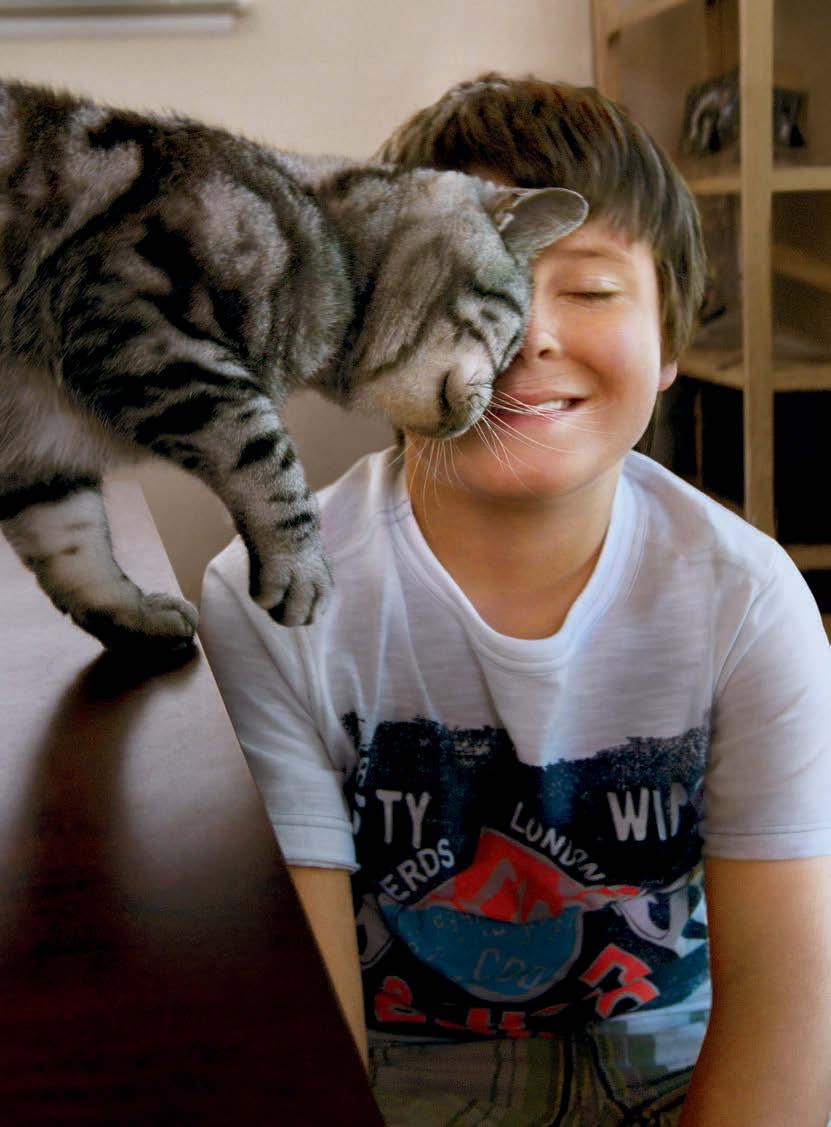





£30 foR eACh pubLisheD LetteR, £50 foR the LetteR of the Month! see p4 foR MoRe DetAiLs


Your article “C’Mon Fear the Noise” struck a chord with me. I live on a main road and find the hum of the traffic quite relaxing—until, that is, some boy racer in a souped-up banger with a chromeplated baked-bean tin in place of an exhaust pipe comes roaring past.
What’s the point? The noise is disturbing and it reduces the car’s performance by wasting energy. The same goes for a large number of motorbikes, whose volume is out of proportion to the vehicle’s size. Is there no legislation that could lead to these wretched things being confiscated and crushed?
As your article emphasised, noise pollution is a serious blight, and we ought to concentrate more on reducing it.
Alec McGregor, LeicesterThe problem of noise was very much brought home to me last weekend, during a visit to Kew Gardens in Richmond. The sound overhead from planes coming in to land at Heathrow every two minutes did detract from the pleasure.
Back home in Dorset, an area of outstanding natural beauty, there’s also no escape from the noise, be it jumbo jets on flight paths to nearby Exeter, Bristol or Bournemouth, or the frequent helicopters and light planes.
But least it’s not affecting me—a recent medical check revealed that my blood pressure was excellent.
Ron Chiverton, Dorset
the folly of youth
I found myself nodding along with Jeff Green’s Maverick article “We Don’t Get Wiser With Age”, but it’s still true that the young think they know it all. Mark Twain said, “When I was 16, I thought my father knew nothing. By the time I was 21, I was amazed at how much he’d learned.”
If this can be extended, then it’s possible to increase our wisdom as we grow older

lee Jarvis @leeJarvos
Can’t beat reading @rdigest to start the day off.

by maintaining a curiosity about the world and everything in it. The problem, of course, is being able to remember all the new knowledge we’ve gained!
Valerie Richards, Glasgow
heritage homes
It was interesting to discover in “Best of British” exactly where our literary and artistic giants have found inspiration. As a playwright myself, I do need a place to go and think. Sadly, at the moment, it’s the shed at the bottom of the garden.
Rob Colworth, Cambridgeshire
I agree with what James Brown says in “Reasons to Be Cheerful, Part 33” about getting off the grid. Sharing a moment on social media these days seems to be more important than living it. Surely it’s better to inhabit the real world than experience it second hand.
Leigh Rennie, Glasgow
shooting his mouth off David Gower’s comments in “If I Ruled the World” are full of the usual claptrap we get from people who shoot. He says the estates he shoots on are well run,
but for whose benefit? These environments are created so that people like him can blast away at game birds, and to hell with the rest of the wildlife.
“DaviD Gower says the estates he shoots on are weLL run, but for whose benefit?”
oliver Craig, edinburgh
The day David Gower eats a fox is the day I support fox hunting. susan Ager, essex
an apple a day
I liked your recommendation of scrambled eggs on toast in “Eat Your Way to the Perfect Day”, but I have to admit that, until the age of 40, I ate a full English breakfast every morning. I then switched to cereal, but this meant I needed a biscuit and a coffee by 11am.
Suddenly putting on weight, I took to the “Hay diet”—one fruit meal, one protein meal and one carbohydrate meal. Choosing the fruit meal for breakfast for the last 20 years (one apple and a glass of water), I find I can sail through until lunch with ease. Ruth papworth, east sussex
clarification: In our September interview with Martin Clunes, we stated that Martin took his wife Philippa out of hospital to be cared for at home, when he decided that it wasn’t appropriate for her to have an operation.
Martin would like to clarify that this decision was not his alone, but was made jointly with his wife, and that she wasn’t cared for at home, but was put in the care of a different doctor.
Apologies for any confusion.


If you spit blood when you brush your teeth, it could be an early sign of gum disease, a leading cause of tooth loss. So, if you spit blood in the sink when you brush your teeth, try Corsodyl Mint Mouthwash. Nothing is more effective at treating gum disease.* Find out more at www.corsodyl.co.uk
CLINICALLY PROVEN. FOR PEOPLE WHO SPIT BLOOD WHEN THEY BRUSH THEIR TEETH.

*Over the counter medicines only. Corsodyl Mint Mouthwash contains chlorhexidine digluconate. Bleeding gums can be a sign of gum disease and not treating may lead to tooth loss. Always read the label. CORSODYL is a registered trade mark of the GlaxoSmithKline group of companies.










































r a d ar your short, sharp guide to october
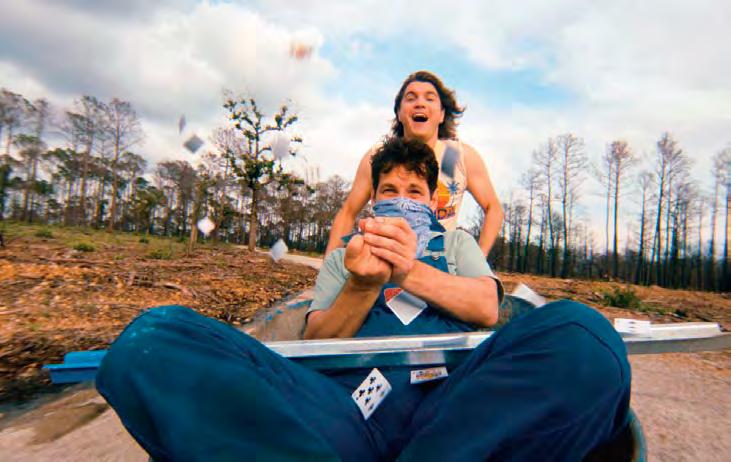

Author and BBC4 Review Show critic
Natalie Haynes on the new releases
in cinemas Prince Avalanche As Denmark and Sweden crush all before them in the great Scandinavian drama invasion (like Eurovision for people who hate pop music), we haven’t heard much from Iceland. But all that could be about to change with this American remake of an Icelandic film.
Paul Rudd and Emile Hirsch star in roughly nine miles of road movie. Why so slow? Because their job is to
paint the lines down the middle, and the road they’re fixing is in Texas in 1988, the year after a huge forest fire. The film is beautifully shot—blackened trees set off by the bright yellow paint Alvin and Lance are spraying onto grey tarmac.
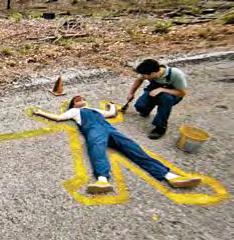
The two men meet a trucker with a crate full of moonshine and a woman who lost her home in the fire. As their stories unfold, both men realise that they need to change their lives for the better.
A small town (population: 6,000) on the border of Alabama, Muscle Shoals has played host to more iconic musicians than you can count: Aretha Franklin, the Rolling Stones, Etta James and Jimmy Cliff, just for starters. This clever documentary intercuts the rise of the FAME Studios (a warehouse amid cotton fields) with a biography of owner and producer Rick Hall, and interviews with the artists he drove to new levels of brilliance.



Along the way, we hear how they made the extraordinary Muscle Shoals sound: mixing black and white musicians and songwriters when few dared. Of course, the soundtrack is the best you’ll hear on any film this year: “I Ain’t Never Loved a Man”, “Mustang Sally” and “Wild Horses” are just three of my favourites.

reader radar
Chun Sun
Chan, 40, teacher
and natalie’s pick of the dvds
Watching: Top Gear (BBC2)
I love the camaraderie between the show’s three presenters and the tongue-firmly-in-cheek two fingers to political correctness.
Reading: Carte Blanche by Jeffery Deaver I’m a massive Bond fan and this is an interesting recent take on Ian Fleming’s spy.
Behind the Candelabra
Michael Douglas dusts off his mantelpiece for the awards he’ll win in this hilarious portrayal of Liberace.
Now You See Me A crack team of magicians (including Jesse Eisenberg and Isla Fisher) team up to rob a bank, Vegas-style.
Online: stephenwildish.co.uk
He posts a new piece of funny, charmingly simple art every Friday. I also both love and hate Facebook.
Listening: Hand Built by Robots by Newton Faulkner It struck a chord with me and helped me through a painful time.


BBC 6
Music’s Stuart
Maconie’s pick of the recent releases
Right Thoughts, Right Words, Right Action by Franz Ferdinand
Think glam rock with five A*s. There was a definite sense after Franz’s Ferdinand’s third album
Tonight of a band becalmed artistically and burdened by the expectations of their early golden promise. So how heartening to hear them come back with a record so brimming with stomping tunes, swagger and their characteristic art-school smarts. This is the sound of a group recovering their mojo big style—though they’d never use such a crass expression, of course.
12-Inch 80s Club Classics by Various Artists
Think three CDs of sweaty nostalgia
Some of the only music worth hearing in the middle 1980s, particularly

on the UK’s dance floors, emanated from the megalopoli of the US. After a dull few years of empty aspirational New Romanticism and formulaic fey indie poppery, we got a shot in the arm from Detroit, the Bronx, LA and more, each with their own spin, from the bleak, blippy and edgy to the silky and luxurious. Relive your uptown youth with these expanded versions of anthems from Inner City, Mantronix, Nu Shooz, Steve “Silk” Hurley and more.
The Ghost of the Mountain by Tired Pony Think The National’s gravity and Coldplay’s cinematic charm. Paradoxically, a supergroup helmed by two of the least arrogant, most amenable men in rock: Snow Patrol’s Gary Lightbody and R.E.M.’s Peter Buck. This is their second record and sees them finding their own voice, a kind of widescreen Celtic Americana, full of spacious arrangements and a deep sense of yearning. The music’s plangent honesty and passion is easy to mock, but many will find it utterly intoxicating.


Technology expert, BBC 5 Live presenter and Answer Me This! podcaster Olly Mann reveals the latest must-haves
also on our radar…
October 2
Classic BRIT awards, Royal Albert Hall, London
October 3
National Poetry Day
October 11
Nobel Peace Prize winner announced, Nobel Institute, Oslo
October 24
Sir Alex Ferguson’s autobiography released

ION Clipster Speaker, £29.95 the Nineties, annoying everyone on the bus with your wicked choons required a boombox the size of a fridge. In the Noughties, the more practically minded punkster would deploy the built-in speakers of their mobile phone, but the results were tinny, with songs sounding like they were sung underwater. Clipster combines the resonance of the old with the portability of the new. Clip on to your belt loop or handbag, sync up to your smartphone and board the 341.
and check out…

Freeze & Go wine cooler, £25.49
Picnics: great. Warm wine: bad. This carrier folds up in the freezer and keeps a bottle cold for ten hours.
Osprey Cyber Port rucksack, £70 It’s de rigueur for backpacks to come with pockets designed to hold books, a bottle or some stationery, but this is the first I’ve seen to include an iPad port. Simply zip down the front portion to access and operate your tablet through a waterproof membrane. Seems niche, I know, but you’ve got to stow your tech somewhere while you’re out and about, so why not in such a way that you can refer to Google Maps without opening your bag? More useful than it sounds.

Remote Controlled Mercedes Benz SLS AMG, £100 Vroom! It may only be 1/16th of the size of the real thing, but it’s also only 1/1,500th of the price.



ESPNcricinfo cricket blogger, broadcaster and stand-up comedian
Andy Zaltzman previews the best of the month’s action
Men’s World Squash Championship, Manchester, October 26–November 3
Home hopes James Willstrop and two-time champion Nick Matthew, the world numbers three and four, will seek to dethrone Egyptian wizard Ramy Ashour, one of the sporting world’s leading active geniuses. He’s been unbeaten since May 2012, and possesses such finesse, movement and dexterity that he could probably perform a successful appendectomy with his racquet while avoiding being bitten by a swarm of hungry crocodiles. He’s dominating men’s squash much as Henry VIII used to dominate the England’s Worst Husband competition.
Weightlifting World Championships, Wroclaw, Poland, October 16–27
A sport of surprising tactical intricacy and narrative drama, but, above all, a sport
in which people the size of trucks lift the equivalent of trucks. The world’s leading male lifter of last year, Behdad Salimi (below), a giant Iranian, will look to add to his Olympic gold in the plus-105kg category. Last year’s top woman lifter, 53kg Olympic champion Zulfiya Chinshanlo, should be representing Kazakhstan, despite China’s efforts to remind her that she was born Chinese and was once called Zhao Changling. A strange sport, but a compelling one.
World Combat Games, St Petersburg, October 18–26
Fifteen different types of highly technical scuffling, ranging from judo to sumo, and fencing to fisticuffs. Some of the world’s leading tusslers will attempt to punch, slap, hurl, kick, skewer, crunch or chop each other to distraction in a nine-day festival of the fracas. n

¶ one afternoon, while i was in the garden, I could hear my six-year-old twins having a chat about whether they should help themselves to a biscuit from the cupboard.
I was curious to see what they would do, as they both knew they had to ask permission first. I moved nearer to the house to listen.
“You can’t open the biscuit cupboard without permission,” said one.
I smiled, thinking that my rule had been understood and would be observed.
“What’s permission?” said the other.
“I don’t know—let’s go for it!” came the reply.
Emma Wilde,London
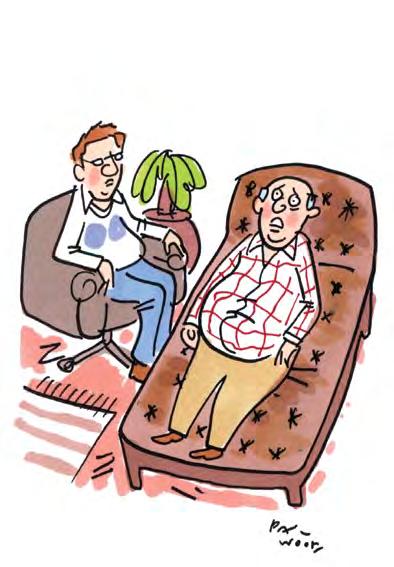
¶ I was doing an internship at a telemarketing firm that was rather disorganised.
One of my fellow interns didn’t turn up to work one day. She sent an email saying her inbox had been hacked via the computer she’d used at work and she didn’t feel safe at this office any more.
The office staff weren’t that surprised when the IT officer checked her computer and found “How to quit a crappy internship” in the internet history.
“i’m oK about losing my hair and getting a paunch, but i’ve started listening to jazz…”
Sana Fijiwala, London
¶ After struggling to get back into my summer clothes, I decided to get fit.
I got on my bike and pedalled off, but as I struggled up a slight incline, a young man cycled passed me and said, “You’re fat!” Shocked at his rudeness, I shouted after him, “That’s why I’m on my bike, you fool!”
He gave me a strange look and replied, “I said your back tire is flat.”
Maybe I’m just paranoid.
Fiona McGarry, Hampshire
¶ I’m always having difficulty giving my address over the phone. After several attempts saying the word “severn”, only to have it confused with “seven”, I thought it might be helpful to describe severn in terms of
the river. This seemed to do the trick, but it must have been a test of the postman’s skills when my letter arrived with this address: Severn Road As in the River, Porthcawl.
Name withheld, Porthcawl
¶ When working at my nursery one day, I twice had to tell a group of small children not to play near the frog pond, in case they fell in.

“i’m going to set this lot up—will contain scenes that some may find upsetting and strong language throughout”
When I saw they’d returned to the pond for the third time, I put on my best stern face and went to tell them off. As my shadow fell on one of the little girls, she turned around with a terrified look on her face.
Feeling glad that she finally seemed to be taking my message on board, I was about to deliver a firm lecture—until she broke into a beaming smile
¶ when a friend of mine was a newlywed funds were very tight. So when her father popped in unexpectedly and she offered to make him a cup of tea, she quickly realised
Win £50 for your true, funny stories. email excerpts@ readers digest.co.uk or go to facebook. com/readers digestuk
upon recognising me and said, “Oh, I thought you were a snake!”
Rachael Carn-Stevens, London
¶ My wife’s a part-time barmaid and was having trouble with a rowdy male customer.
When he asked her the way to the toilets, she told him, “Go down that hallway and you’ll see a door marked ‘Gentlemen’. But don’t let that deter you.”
Jason David, Hertfordshire
that she’d run out of milk.
She knew she couldn’t admit to her father that she didn’t even have money for a pint of milk—she’d get a lecture about budgeting and standing on their own
two feet. Trying to think fast, she looked around the kitchen and spotted the cat’s milk bowl.
Her father had his cup of tea and was none the wiser.
Bridget Carroll, Bolton n
Formulated by Vitabiotics experts with vitamin D to support the normal function of your immune system
Immunace® has been developed by Vitabiotics’ pharmacists and leading scientists in nutritional research to help maintain all round health and vitality, whilst providing specific nutrients such vitamin C, zinc and selenium which contribute to the normal function of the immune system.
Immunace® Extra Protection is an advanced formula that includes all the benefits of Immunace® Original plus more, with 1000 IU vitamin D.










To mark World Farm Animals Day on October 2, we have a veritable menagerie of words for you. So if you think you know all about the language of the animal kingdom, try answering A, B or C below.
1 fauna n A baby deer
B beast of myth C animal life in a region
2 nicker v A chirp like a cricket B chatter like a chimp C whinny like a horse
word
3 savannah n
A grassland B paper fan C tall cabinet
4 nocturnal adj
A fast-moving B without legs C active at night
5 vulpine adj A like a wolf B fox C crow
9 moult v A to expire slowly B shed part of the body C make a nest
10 clutch n
A forepaw B nest of eggs C predator’s quarry
11 tawny adj
A of a warm sandy colour B having talons
C with soft feathers
12 prehensile adj
A adapted for grasping
B developed in an eggshell C insect-eating
13 estivate v
A to store water as camels do B change habitats C sleep through the summer
14 territorial adj
A like a terrier B relating to a specific area C having an ability to swim
15 polecat n
A otter B badger C ferret
Owling cover star e lizabeth
A somewhat unlikely internet craze, this describes the practice of posting pictures of oneself online crouching in unlikely places, in the style of a perching owl. Pointless but fun. RD Rating: Useful? 2/10 Likeable? 7/10
6 flews n A swarms of midges B cuckoo nests C droopy lips, like a bloodhound’s
7 aquiline adj
A resembling an eagle’s beak B living in the sea
C warm-blooded
8 piebald adj A hairless
B spotted C scaly
Words by Emily Cox and Henry Rathvonmcgovern’s favourite word?
“It’s probably Umm… I like to think about things before I give people an answer”
9–11 getting there
12–13 impressive 14–15 word-power wizard!
1 fauna C
animal life in a region. “I studied Kenya’s fauna for the safari.” Latin fauna (name of a rural goddess).
2 nicker C whinny like a horse. “Dobbin nickers so well that people feed him oats.” Sixteenth century.
3 savannah A grassland. “The cheetah stalked its prey on the savanna.” Native American zavana.
4 nocturnal C active at night. “The nocturnal chirping of crickets can be quite noisy.” Latin nocturnus (of the night).
5 vulpine—B like a fox. “I approached the poached eggs with a vulpine lick of my lips.” Latin vulpes (fox).
6 flews—C droopy lips, like a bloodhound’s. “When my dog snores, his flews flap in the breeze.” Sixteenth century.
7 aquiline—A resembling an eagle’s beak. “Actor Adrien Brody makes an aquiline nose look good.” Latin aquila (eagle).
This comes from the mediaeval Italian mal (bad) and aria (air), describing the miasma from the swamps around Rome. This “bad air” was believed to be the cause of the fever that often developed in those who spent time around the swamps. In fact, the illness—now known as malaria—was the result of certain protozoans present in the mosquitos that bred around these swamps.

8 piebald—B spotted. “Of the many cattle breeds, I like the piebald.” Latin pica (magpie, because of the black-and-white plumage) and Middle English bald (streaked with white).
9 moult—B shed part of the body. “It’s normal for chickens to moult during the autumn.” Latin mutare (to change).
10 clutch—B nest of eggs. “The hen aggressively protects her clutch.” Old Norse klekja (to hatch).
11 tawny—A of a warm sandy colour.
Play WP online: go to readersdigest. co.uk/wordpower
“A lion cub has a tawny coat.” Old French tane, from tan (type of bark).
12 prehensile A adapted for grasping. “The giraffe’s prehensile upper lip helps it strip leaves from trees.” Latin prehendere (to grasp).
13 estivate C sleep through the summer. “Desert reptiles estivate underground to shelter from the strong sun.” Latin aestus (heat).
14 territorial B relating to a specific area. “Cats are very territorial animals.” Latin terra (land).
15 polecat C ferret. “Tina has invented a pungent perfume she ought to call Polecat.” Middle English. n
Our fantastic invisible hearing aid is small. Really small. And, because it fits slightly deeper in the ear canal than your average hearing aid, it’s virtually invisible when worn. That means you get all the benefits of hearing better without anyone understanding how you do it.
Whilst it can’t be seen the difference can be heard.
Just because this hearing aid is small doesn’t mean it’s less effective. We’ve made sure this tiny device has the high speed processors and clarity enhancing features of the very latest hearing aids. These are the things that make sure you get to enjoy all the great things life has to offer like conversations with friends and family, an evening out in your favourite restaurant or a cosy night in front of the TV. And you can enjoy all this with the confidence that whilst people might notice the difference in your hearing they definitely won’t notice your hearing aid.
If you like what you (don’t) see, call 0845 203 7662 and book a free appointment in store to find out more about this amazing little hearing aid.
“I hear normally, it’s as if I don’t have a loss and, because you can’t see them, no one else knows I do!”

Free hearing check
To book your hearing check simply call 0845 203 7662
Terms: Valid until 31 October 2013. Free hearing check for over 18s only. Only one free hearing check per year.


Born Marie McDonald McLaughlin Lawrie in Glasgow, Lulu had her first hit with “Shout” in 1964 when she was 15. She’s since had dozens more all over the world, and featured in countless TV shows from It’s Lulu to Ab Fab. She appeared on Top of the Pops in each of the five decades of its existence.
Record companies would be run differently. as far as i’m concerned, the job of a record company is to nurture real musical talent. and, believe it or not, they used to be like that. these days, if you don’t have a big hit with your first record, you’re finished. it’s all about sales and, unfortunately, music doesn’t work like that. you can’t measure it in units. if you look back to labels like motown in the sixties and island in the seventies, they believed in their artists and invested their heart and soul in the music. it felt very organic and it felt very real. the music business has got itself into a right state, and it ain’t gonna change unless we create labels that care about music.
All traffic wardens would be made to wear clown suits at work. Parking in london drives me mad! you’re only there for a few seconds and the meter maids— i’m giving my age away here, no one calls them meter maids any more—swoop down on you. i always try to retain a sense of humour if i get a ticket. a clown suit would help put a smile on my face!

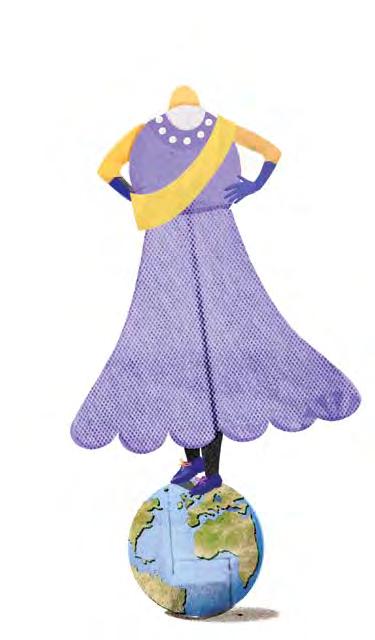
I would bring back old-fashioned parenting skills. i was at a restaurant with my sister recently, and we were watching a lady with a young girl. the girl was creating a real fuss but, instead of taking her off into a corner and telling her to be quiet, the mother just rolled her eyes and said, “oh, she’s so strong-willed.” my sister and i looked at each other and shook our heads. i see my own son with his three-year-old and he’s tough on her—but discipline lets a child know exactly where the boundaries are. and boundaries make a child feel more secure in their world.
Things would be made to last. When my mum bought a new vacuum cleaner or a fridge, she expected it to last a lifetime. and if it didn’t, it would be repaired. all our modern gadgets and gizmos seem to pack up after a couple of years, but nobody says a damn word about it! We just chuck them away and buy new ones. it’s so bloomin’ wasteful!
The elderly would be given a role in local and national government. if you look at other countries, the elderly are regarded as invaluable members of the family and of society as a whole. Why have we forgotten them here? one of my first laws would be to create local and national panels of over-65s to advise councils and the Government on a whole range of issues. the country would benefit from their wisdom and experience, and the panels would also be a reminder of the important role our parents and grandparents can play in our daily lives.
I would end violence against women. i’ve just read a book called Half The Sky: Turning Oppression into Opportunity for Women Worldwide and it really opened my eyes to some of the awful things going on around the world: sex trafficking; everyday violence; lack of education. and that’s where my campaign would start —education. it’s no good just throwing men in jail if we’re not tackling the root causes of this problem. i would get a great team around me—there’s no way
“boundaries make a child feel more secure in their world”
one person could do this on their own—and i’d get into schools and make sure that girls and boys understood that violence against women is wrong wrong wrong!
I’d sort out the huge disparity in wages. don’t ask me how, because i haven’t got the foggiest idea! all i know is that if an alien landed and saw footballers and financiers earning millions while nurses and teachers were struggling to pay their bills, he’d think we’d all gone crazy. i’m not saying you don’t have the right to be wealthy. i don’t begrudge anyone who’s done well for themselves. but the people who look after our kids, and who look after us when we’re ill, deserve better.
I’d find some way to make [muchloved Scottish sweet] tablet healthy. tablet is a part of growing up in scotland. unfortunately, it’s made from condensed milk, butter and sugar. c’mon, scientists! Get your act together. if we can put a man on the moon, surely we can come up with a way to make tablet that’s actually healthy. i’d definitely chuck a few million into research. then i’d be able to start eating it again! ■ As told to Danny Scott
Lulu performs at Under the Bridge, London, on October 4. Time Bomb, her skincare range, is available on QVC.
There’s nothing like old friends, says James Brown,
I’m not sure how my old friend Harper reappeared, but he did—for only the third time in 15 years. It was great to see him. Tall, heavily bearded and bald, he arrived with nothing and left with a freshly borrowed £20 note. By then, though, we’d enjoyed the sort of funny, comfortable and familiar evening that people who see each other every week have. It made me think I really should try and organise myself to see proper friends more often.
ring when he witnessed my wedding. I provided mild entertainment when I witnessed his. Our friendship outlasted both marriages.
On a holiday in France in 1990, his family laughed as I electrocuted myself on a cattle fence after climbing out of the pool to get his son’s frisbee. Oh, we had good times.
Harper has had a few more wives since I last saw him, and he’s now back

Twenty-eight years ago when I was a music writer, Harper did the PR for bands I loved such as New Order and Happy Mondays. He took me on my first foreign press jaunt to be funded by a record company: to Holland with the band Pop Will Eat Itself. (Chaos. Like a school trip with no teachers.) We became close friends. He lent me his wedding
with the very nice woman he was dating when we first met, so his love life’s come full circle. But seeing him walk through the front door smiling and ordering a cup of tea made me realise how easy it is to drift away unintentionally from friends you value.
We hadn’t fallen out, but that drift is something that just happens when you’ve

been living long enough. Good friends move for work; starting families at different times edges you in different social directions. Nightclubs are replaced by nurseries, pubs by primary schools, and before you know it, you’re waving your kids off into secondary school where they disappear into teenage life and spend every moment with their friends, leaving you to wonder where the hell all of yours have gone.
although new ones aren’t bad either ►
realised writing this, is my oldest friend. Thirty-five years ago we sat in a Leeds park, held hands and graduated to kissing. Seeing her, along with all those other old friends, makes me feel safe, grounded. My life has taken me to so many places, both exciting and troubled. But if you can see an old friend and enjoy the trust that brings—as well as having conversations about the present, not merely the past—then you’re onto a good thing.

Facebook is a fantastic way to stay in touch but it’s not real friendship—more an electronic pen-pal system. Since Harper’s visit, I’ve taken more time to respond to friends’ invitations: a 50th birthday party for the first guy I lived with in London—so many old faces, excolleagues, former girlfriends; a monthly lunch with someone who, I’ve only just
A good friend of mine recently sent me some books by Charlie Connelly, saying how much he loved them. He also told me he’d become friends with the author. After I’d read one of them, Attention All Shipping —a brilliantly funny travelogue about all the areas in the Shipping Forecast—I couldn’t help but look him up on Twitter.
Because we just happen to hit it off, every time I see him is like going to a laughter gym
We got chatting and, as I’d planned a trip to the National Maritime Museum in London and knew from the book that he lived near it, I suggested a date. Just as a friend can recommend a book or a band they’ll know you’ll like, so, it seems, they can recommend a person too.
Charlie’s books remind me of many of the travel articles I used to commission for my magazines: send someone funny to somewhere rubbish or challenging and look forward to the resultant moaning. Only in this case I didn’t have to get involved with the kind of
maniacs who generally wrote them. Since then my girlfriend Lisa and I have been out with Charlie and his wife Jude three times, and because we just happen to hit it off, every time has been like going to a laughter gym. So that’s this month’s reason to be cheerful: friends old and new. Make time to go and see them. n
James, founder of Loaded magazine, now edits Sabotage Times—an online magazine with the motto: “We can’t concentrate, why should you?” Follow James on Twitter @jamesjamesbrown
This haunting tale was one of thousands submitted to this year’s 100-Word Story Competition. We’ll be featuring a commended story in the magazine every month.
See p41 for the launch of this year’s contest.

Submitted by Phil Lawder, London
In the early evening, they came back in from visiting the grandchildren. He turned left to the golf on the television, she turned right, to the kitchen, Classic FM and the Telegraph crossword.
Much later, a grunt to say he was going to bed. She rises, tired, empty, moves quietly to the drawer of the dresser. At the back lies the photograph. She coaxes it out. A smile, brief as summer rain, as her hand traces the strong, sepia face, worn and creased, forever twentytwo. A moment’s stillness, then she eases him away and, with a sigh, climbs the stairs.
phil says: “I was watching an elderly couple get out of their car and go into the house without exchanging a word. I began to wonder what would happen after the door closed. I’ve been writing for about ten years, having written a lot as a teenager and student before losing it to the demands of daily life. Several of my short stories have been published and I perform as a stand-up poet in and around London.”
Phil will receive a cheque for £50




Elizabeth McGovern talks Downton Abbey, rock ’n’ roll— and why she’s too angry to meditate
Not unlike the character she’s played for the past four years, Elizabeth McGovern glides gracefully into the restaurant of a hip photography studio in west London. The waif-like 52-year-old—better known around the world as Downton Abbey ’s Cora Crawley, Countess of Grantham—takes gentle, unhurried steps and orders coffee in an almost hesitant voice that struggles to rise above the clattering of cups and saucers.
BY DANNY SCOTT PHOTOGRAPHED BY MICHAEL BIRT ►
Downton Abbey, of course, is more than just a TV programme. It’s become an Emmy- and Golden Globe-winning TV phenomenon. Shown in more than 200 countries, it’s one of the most popular British exports of all time. And now that it’s just returned for a hugely anticipated fourth series, Elizabeth is clearly primed for probing questions about how this year’s storylines will develop. She reveals only that we should keep our eyes on Tom Branson, the former chauffeur and Irish Republican who now sits at the Crawley family’s top table, after marrying the late Lady Sybil. “Household life used to be so clearly delineated, but all this flux is bound to have ramifications,” she says, with her eyebrows raised high enough to hint that these ramifications will be very serious indeed.
able to enjoy it. Jobs like this don’t come along very often.”
In fact, Elizabeth knew serious fame before Downton . She was Oscarnominated for 1981’s Ragtime at just 20, appeared in the epic Once Upon a Time in America in 1984 and for a time became something of a Hollywood starlet. She then scaled back her career when she married British producer Simon Curtis in 1992, moved to London and started a family. Yet, she’s continued to appear in films, on TV and in acclaimed theatre productions.


Although series four has only just arrived on screen, Elizabeth has reportedly been asked by the producers about doing a fifth. So is Downton one of those shows that will just keep on going? “No one connected with the show feels that it would or should go on for ever,” says Elizabeth.
But wouldn’t she miss it? “Are you kidding! Downton has changed my life. It’s given me an unbelievable level of success at an age when I’m
The daughter of a law professor at the University of California, Elizabeth grew up in Los Angeles. She was “bookish and quiet” as a child—“the kind of kid who went to the park and read every sign so I could learn about the flowers and wildlife. My family are geeks. We enjoy learning for the sake of learning. “I was a child of the Sixties, so I certainly had a good time as a teenager—I’ll leave that to your imagination!—but my parents were pretty laidback, so there wasn’t really that much to rebel against. I guess you’d have called me an independent kid. I preferred to do my own thing.”
It’s a trait that seems to run in the McGovern family. Her paternal grandfather was

“We are drawn to Downton, not just because it’s ‘good’, but because it says something about us,” says Naomi Carle, Durham University literature tutor and co-founder of the Edwardian Culture Network.


“The last few years in this country seem to reflect the Downton age,” says Carle. “Britain has had its garden party moments: the Royal marriage, the Jubilee and the Olympics. But there’s also been continuing hardship, the 2011 riots, trade unions back in the news and cultural commentators talking of a national identity crisis. In these uncertain times, people take comfort from the fact that Downton shows how the Edwardian era helped to create a better world despite the struggle and conflict. It shows that we have to keep on plugging away.

The Edwardian era is often portrayed as one long pro-monarchy garden party. But this ignores the massive upheavals of the period—the su ragette movement, the growth of the trade unions and the coming of the First World War—as well as huge technological advances, such as the rise of the car and telephone, that revolutionised daily lives.

“You can see it in the stoicism we’ve shown in the face of the recession. For several years now, there’s been no real improvement in our lives, but, like Downton’s characters, we believe that good old British resolve and a dose of the sti upper lip will lead us to a brighter future.”
» For more on the Edwardian Culture Network, visit edwardianculture.com.

Downton is the most successful British drama ever imported into America. Its writer Julian Fellowes has even been asked to pen a US version for NBC called The Gilded Age. But why has Downton been such a hit in the States?

executive producer. “You’ve may have a relative who was in

“In Britain, we live very comfortably with history and that relationship is reflected on TV,” says Gareth Neame, Downton’s executive producer. “You’ve got a massive choice of programmes about antiques, the Tudor kings, Stonehenge. British audiences may also have a relative who was in service. So Downton’s world is not that far away from us.
“America, however, is all about today and the future so you’ll find very few history programmes, and Downton is like a journey into a wonderful, unknown land—the British aristocracy at its height, the archetypal English country house.
“For Americans, there’s a touch of magical fantasy about the show. They don’t just ‘watch’ it, they want to ‘experience’ it in a very personal way.
“If we go on a talk show, audiences start whooping and cheering for their favourite characters. If we have a Downton event, people turn up in Edwardian costumes, talking in British accents. It’s not enough for them to come and meet the cast—they’re entering into Downton’s world.”
William Montgomery McGovern, a swashbuckling adventurer and anthropologist. Having explored the Himalayas and the Amazon (and learned Chinese) by the time he was 30, he went on to become a noted military strategist during the Second World War.
“Have you heard the story about him being the inspiration for Indiana Jones?” laughs Elizabeth. “I have no idea if it’s true, but wouldn’t that be sooo cool! He certainly lived an incredible life and was apparently the first white man to go to Lhasa in Tibet. He was also one of the first Westerners who properly studied Buddhism, and he lived in a Japanese monastery.”
William died when Elizabeth was three, but he does appear to have had some influence on her. “The trajectory of my career when I was younger made life pretty adventurous. If anything, though, I found myself searching for solid ground. When I met my husband, I knew I’d found it. But I did give up my life and my career, and move to England for love. I guess that was pretty adventurous.”
And what about her grandfather’s other passion: Buddhism? “Living in a monastery and meditating? I wish! I’ve been working constantly for two years. Even I’m bored with myself. When I do get time off, I’m way too busy going to the supermarket and cooking the family dinner to go and live in a monastery. And I’m probably too angry to meditate.”
knows me and they’ll tell you they see a lot of anger.
“Look at the way we treat the world and let each other down. The unfairness of life. I’m not necessarily talking about my life, because I get compensated
Angry? But on screen as Lady Cora she has such calm and poise. “Well, I’m glad I’ve fooled everyone—I must be a pretty good actor. I’m not trying to paint a picture of some terrible personality disorder, but you ask anyone who really ►
“A significant part of Downton’s success—especially in the US—is down to social media,” reckons California-based historical author and blogger, Evangeline Holland. “No one really knew what to expect when the first episode aired over here in 2010, but as soon as it went out, people were all over the internet —blogging, tweeting and wanting to share Downton with their friends. Since then, there’s been a massive increase in Anglophile blogging.”
A lot of this is down to Maggie Smith’s Violet Crawley, Dowager Countess of Grantham—and her fantastic one-liners. “They’re perfect for Twitter,” says Holland. “Like, ‘What is a weekend?’ You say that to your friends at a dinner party and they’ll know exactly what you mean. Type the phrase into Google and you get more than 100 million hits!”

Just in case you’re new to Downton and haven’t come across the Crawleys’ very own Jimmy Carr, here are some of her most memorable put-downs...
Hoping to improve her daughter Lady Mary’s society connections, Cora (the dowager’s daughter-in-law) wonders if a few house parties could be useful.
Cora: “She’s been asked to one next month by Lady Anne McNair.”
Violet: “A most terrible idea. She doesn’t know anyone under a hundred!”
Caption here
Cora: “Then I might send her over to visit my aunt. She could get to know New York.”
Violet: “Oh, I don’t think things are quite that desperate.”
After hearing that Matthew (former solicitor and heir presumptive to Downton) is missing in battle during the First World War, she’s almost sympathetic: “We’re used to Matthew now. God knows who the next heir will be…probably a chimney sweep from Solihull.”
To her granddaughter Lady Edith, when she suggests she might like to drive a tractor: “Edith, you are a lady, not Toad of Toad Hall!”
On the news that Downton might be home to convalescing soldiers: “I forbid it! To have strange men prodding and prying around the house…to say nothing of pocketing the spoons! It’s out of the question.”
“If the emails and tweets we receive every Sunday evening are anything to go by, life at Downton definitely appeals to the modern woman,” says Jacqui Meddings, entertainment editor of Cosmopolitan. “Men are gentlemen, relationships are openly romantic and everyone dresses beautifully for dinner. What’s not to like?”
Downton—along with The Great Gatsby—certainly seems to have inspired the recent interest in 1920s fashion, with UK retailers reporting record sales of waistcoats, cravats, fur capes and arm-length gloves. According to Marks and Spencer, even sherry is making a comeback.
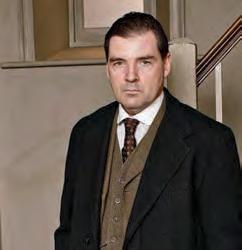
“
Downton is pure escapism,” admits Meddings, “but the beauty of the show—and the reason so many women love it—is that it’s intelligently delivered and not afraid to touch on political subjects, including feminism.
“What’s really interesting is how women react to archetypal Edwardian men like the valet Mr Bates (Brendan Coyle, above). Even in 2013, we’re hard-wired to be attracted to that kind of noble, charming, devoted alpha male.
“Some have argued that Downton’s global success has only reinforced British stereotypes, but I don’t think it’s a bad image to project around the world. Mr Bates sets a wonderful example of how you should treat the ones you love.”
very well for my job, but that doesn’t stop me getting cross at some of the things I see.
“I’m not proud of it, because anger is not useful. I’d love to be able to handle life with Cora’s grace and dignity. But hey, that’s just how it is. I try my best in life and I’ll keep trying.”
Elizabeth does have an outlet for her discontent, though. She leads Sadie and the Hotheads, a critically acclaimed, UK-based Americana band.
“Music first hit me when I was growing up in LA. Listening to stuff like Joni Mitchell, Neil Young, Leonard Cohen and Paul Simon. I played a little bit of guitar, but didn’t have the confidence or talent to want to be a rock star. Then, about 15 years ago, I met some musicians—some of whom are still in the band—and they convinced me I could carry a tune.
“Music gives me a freedom and happiness that I don’t find anywhere else. When something gets me down, I can write a song about it. A young girl came up to me recently and said, ‘Your songs changed my life. Thank you.’ I love acting and I know that a film can change people’s lives, but when someone walks up to you and says that your lyrics mean something, it hits you on a very personal level.
“[The band] has been responsible for some of the happiest moments of my entire life. We supported Sting at the Montreux Jazz Festival earlier this year and, as I walked off stage, my 15-year-old daughter threw herself into my arms with such pride that it overwhelmed me. Even sitting with you
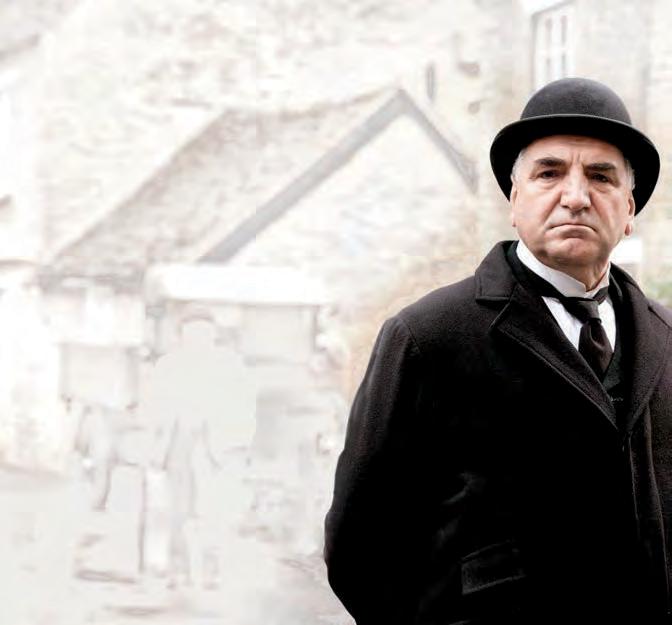
Jim Carter (who plays Carson the butler, below) is one of Britain’s most respected actors, with roles in The Singing Detective, Brassed O and The Madness of King George. But he’s never experienced anything like the success of Downton. “I took a cycling holiday in Cambodia last year and I was sweatily pedalling through the countryside when I heard, ‘Mr Carson! Mr Carson! Can we have your autograph?’ I was suddenly surrounded by a coachload of Chinese tourists. I’d been recognised in Cambodia!
“Walk down the street in Manhattan, I get stopped more than in London. I never imagined that would happen to me. When the cast visited Washington, we were given a private tour of the White House by Michelle Obama’s housekeeper at 10 o’clock at night.
“When I see friends, too, so many of them ask, ‘Hey, Jim, when’s the new series?’ or ‘When are you going to get together with Mrs Hughes?’
“Most of the time as Carson, I just stand around feeding people too posh to feed themselves—but the world has never shown so much interest in anything I’ve ever done! After 40 years in this business, you’re happy if your career just keeps chugging along, but Downton has taken things o the scale.”
“At the start of the multichannel era, we were told that we’d turn into a splintered audience of niche consumers,” says Professor Joe Moran, author of Armchair Nation: an Intimate History Of Britain In Front of the TV.
“
Downton Abbey demonstrates that TV drama can still pull in a
huge audience that wants to be part of a collective TV experience. In the 1980s, this was known as ‘The Dallas E ect’.
“Downton has also proved that, in an age of reality TV, people are still drawn to traditional narrative drama. They enjoy a story, they want to know what happens next.
At around ten million, Downton’s audience is half that of classic period dramas like Upstairs, Downstairs, but thanks to social media, its cultural impact is far greater. Papers and magazines in the 1970s never discussed Upstairs, Downstairs in the way we’re now discussing Downton Abbey.”
Not content with record-breaking TV audiences, Downton is about to launch its own range of homeware, furniture, wallpaper, fashion accessories and beauty products.
“There’s certainly a lot in Edwardian design that appeals to modern tastes,”

says Eleanor John, of London’s Ge rye Museum (aka the Museum of the Home), which was visited by the Downton team when they researched the look of the show. “After all the fussiness of the Victorian era, the Edwardians kept things relatively simple. There was a general decluttering in the home.


here today, I can still feel the power of that moment.”

“Obviously, a lot of people will buy a Downton range because they love the show, but the domestic interior— because it plays such a central part in our lives—can trigger huge nostalgia. Older people may remember the look from their own childhood homes; younger people may think of their grandparents.” a central part in our from their own
But don’t her two children mind mum shakin’ her booty at 52? “Age has got nothing to do with it,” says Elizabeth firmly. “I’m not saying there haven’t been embarrassing moments over the years. The whole family screaming at me to shut up while I was practising in the bedroom. Gigs where nobody turned up to see us, gigs where I’ve forgotten the words and played the wrong chords… But I think my family knows the band has now achieved a level of recognition that makes us legitimate.”
“This one’s for Carson”: Sadie and the Hotheads in action

So could Elizabeth imagine Lady Cora getting a bit more rock ’n’ roll? “I don’t know if this is total coincidence, but Cora is certainly instrumental in bringing Kiri Te Kanawa’s character to Downton in this series. We’re moving into the jazz age and she obviously enjoys music.
“But how would she get more rock ’n’ roll? That’s a good one. Maybe we could have her knocking back a few whiskies and giving Robert [her husband, the Earl of Grantham] a piece of her mind! Ha ha!

actor that I get totally suckered by his portrayal of Robert. I don’t know if you can see it on screen, but I’m often sitting there thinking, One of these days, I am going to wring your damn neck, you stuckup, pompous snob!
“Watch me closely in the new series… see if you can catch me getting ready to kick his ass!” n
The new series of Downton Abbey is on ITV1. ITV
“Hugh [Bonneville] is such an amazing

Our incredibly successful 100-word-story competition is back for a fourth year. This is your chance to win £1,000 and see your work published in the magazine—all you have to do is write a brilliant work of fiction in just 100 words. For inspiration, turn over to read three stories from top authors— written exclusively for Reader’s Digest —and find details of how to enter ►

▪ Please send your stories—which should be original, unpublished and exactly 100 words long—to 100wordstory@readersdigest.co.uk by January 31, 2014.
▪ There are three categories— one for adults, and two categories for schools: one for children aged 12–18, and one for children under 12.
▪ In the adult category, the entry voted best by our panel of judges will receive £1,000, and two runners-up will each receive £100 in book tokens.
▪ In each of the school categories, the prize for the winner is £500 of high-street vouchers of their choice, and £500 for their school, and two runners-up will each receive £75.
▪ Mark each entry either “Adults”, “Schools 12–18 category” or “Schools under-12 category”. Winning entries will be published in a future issue.
Many of last year’s stories were so good, we decided to publish them online—read them at readers digest.co.uk/ magazine
they say soldiers grow hardened to the sights of war. But you never get used to this: a woman, wailing in the road, her head bowed over the body of her dead son.
Can he offer her some comfort?
He steps towards her. Curious locals stare from either side.
He’s ten yards away when he hears a warning shout.
He stops. then he sees them: wires spilling from the boy’s lifeless form. run!
too late. the woman fires him a sudden look of hate. He sees a concealed detonator in her fist.
the explosion is the last thing he hears.

▪ Chris Ryan is a best-selling actionadventure writer. His new novel Masters of War (£18.99) is out now
“I did say that. I don’t have eyes in the back of my head. what did you say they had moved?”
“the Loop Prototype. It was in the deep freeze.”
“they were probably after a pizza. did you leave it on top of the pizzas?”
“Listen: the Loop Prototype is unstable at room temperature. It could…”
“well, why did you put it on top of the pizzas, then? I don’t have eyes in the back of my head.”
“the hell with pizzas. Listen: the Loop Prototype is unstable at room temperature. It could…”
“well, why did you put…”

▪ Journalist and author Sam Leith’s latest book You Talkin’ To Me? Rhetoric from Aristotle to Obama (£8.99) is out now Rules:
the church was dim, stone-cool, filled with rich people, whispering, waiting. she watched him, numb, from her pew as he laughed with his best man, brazen in his silk waistcoat.
He promised he’d tell her “soon”. But he hadn’t. then “too big to cancel,” he’d said. too weak to cancel, more like. she loved him nonetheless.
Mendelssohn on the organ. Her, the bride: pure, white, floating. so beautiful they gasped.
Amplified words: “does anyone present know a reason…?” None did.
“do you take this man…?” silence, loud and trembling. A father’s quiet word, urging on. But silence still. then sobbing.

▪ When You Walked Back into My Life by Hilary Boyd (£7.99) is published this month
It’s the disease that robs us of ourselves, but there is help—and hope
One day, you try to read a book, but can’t understand the words. Later, you get lost in your own neighbourhood. Eventually, you won’t recognise those you love. Your body is still there…but you’re gone.
Alzheimer’s disease was first identified in 1906 by German scientist Alois Alzheimer. Today, around half a million Britons have the fatal illness, and the World Health Organization estimates that some 18 million people around the globe suffer from it—a figure expected to rise to 34 million by 2025. It will have a huge impact on our society.
For those at risk, already suffering or caring for a sufferer, here’s information and advice for helping to prevent, delay and cope with Alzheimer’s, as well as information about the treatments available —now and in the future.
Anyone can struggle at times to remember the title of an old film or an acquaintance’s name. But the first symptoms of Alzheimer’s disease
►

are more dramatic than occasional lapses of memory.
People with incipient Alzheimer’s are unable to do what they’ve always done, such as paying bills or counting out money in a shop. The sense of smell often diminishes before the disease is apparent. Or its onset can make people suddenly suspicious of those they trust.
If you or someone you care for has such symptoms, go to your doctor. Usually, he or she will assess memory using a cognitive test. If the patient finds that difficult, the doctor will probably refer them for further assessment, including a brain scan.
Although not yet widely used, spinal fluid testing is considered one of the most accurate indicators of the disease. It measures levels of the proteins involved in Alzheimer’s and, when combined with a brain scan, offers an 85 to 90 per cent accurate diagnosis.
Studies show that exercise might help to slow the progression of the illness, even after symptoms appear
tAckling tHe symptoms
If Alzheimer’s disease is diagnosed, drugs such as donepezil, galantamine, rivastigmine and memantine may improve memory and reasoning symptoms temporarily. But these drugs don’t work for all patients and, says Kaj Blennow, professor of clinical neurochemistry at Sweden’s Sahlgrenaska University Hospital, the disease will probably “catch up” sooner or later.
Your doctor may recommend exercise.
Studies suggest that it might help to slow down the progression of the illness, even after symptoms appear.
He or she may also suggest supplements. One recent study looked at people with mild cognitive impairment who took high doses of vitamins B12 and B6. The supplements “slowed the rate of shrinkage of the brain…and cognitive decline over two years”, says study co-leader and Oxford University professor emeritus of pharmacology, A. David Smith.
A new medical drink, Souvenaid (made up of essential nutrients including omega-3 fatty acids), is now available from chemists. After 24 weeks of using the drink, people with mild Alzheimer’s scored better on memory tests than those who drank a placebo.
Says Dr Philip Scheltens, director of the Alzheimer Centre at the VU University Medical Centre in Amsterdam, “The combination of essential nutrients is better than each of them alone.”
In February last year, scientists at the University of Columbia, New York, and the Norwegian University of Science and Technology in Trondheim, reported findings that could change the course of how we treat Alzheimer’s disease. They proved that it moves through the brain along a predictable path—from the first brain cell affected to the one next to it and so on.
Scientists have long known that the worse the symptoms of the disease, the more brain area is affected, but most research had focused on amyloid beta protein plaques. These are found between brain cells in Alzheimer’s patients and it ►

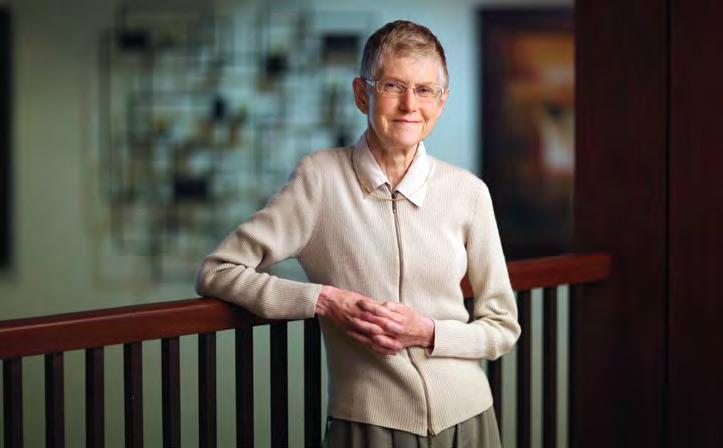
Ann Johnson, MBE, 60, from Hale Barns, Manchester, is a former nurse and lecturer in nursing at the University of Manchester. She was diagnosed with Alzheimer’s disease in October 2005, aged 52
My dad had Alzheimer’s and, some ten years ago, things that had happened to him started happening to me. I found myself getting stuck for words, getting lost and forgetting to take medication.
My GP sent me to a memory clinic in Manchester in January 2005 and, over the next few months, I went through a series of procedures, scans and memory tests. I continued to work in the school of nursing, but had no clinical contact with patients and I did find my job more and more difficult. So when the Alzheimer’s diagnosis finally came that autumn,
I took early retirement.
I’m unmarried, so I decided to move into a care home. I’m the youngest resident, but I’m so well cared for, stimulated and safe. When things really go downhill—it could be next week or 20 years away— hopefully they’ll look after me, and we’ll go from there. But at the moment, I can get out each day, which I do as much as I can, and I take galantamine to try to keep things stable.
I use a dictaphone to remember things and wear a tag round my neck in case I get lost. I can’t count money, but I find people kindly count it out for me.
Because I’ve been through the disease with my father and my patients, of course I’m terrified of the future: I know what I can expect. But that doesn’t change anything, does it? So I just live every day as I can. Sometimes the crying starts. Why can’t I read a book? Why can’t I write letters? But I keep the tears for my own room.
My main mission in life is giving talks as an ambassador for the Alzheimer’s Society. It gives me great joy. I always say: “Three things keep me going: my friends, my faith and doing my talks.” Take them away and I’m lost.
photographed by gabriel szabo/guzelian

Keith Oliver, 57, a former head teacher from Canterbury, Kent, was diagnosed with Alzheimer’s disease in December 2010
Alzheimer’s wasn’t on the radar. I kept falling over, felt tired and couldn’t concentrate, but I thought I had an ear infection. Then an MRI scan—to rule out a brain tumour—disclosed shrinkage of the brain. “It suggests we’re looking at the early stages of dementia…Alzheimer’s,” the neurologist told me. You could have knocked me down with a feather.
On New Year’s Eve, 2010, after lots of other tests, the diagnosis was confirmed. There was no celebrating that night.
I reluctantly left my job
and, overnight, a vacuum was created in my extremely busy life. Everything stopped.
But there were practical issues to sort—finances, lasting power of attorney, wills. After that, we were able to move on and live life as normally as possible.
My wife Rosemary and I cope pretty well, but very differently. Rosemary prefers to live quietly for the day, but I confront the condition by trying to stay one step ahead of it.
I keep a detailed diary with a very structured plan for the week ahead, which
gives me security. I visit a chiropractor once a week for spinal adjustments (good for transferring messages to the brain), have a fortnightly massage and attend lectures on health, exercise and diet—a well-being package that has been extremely helpful.
I don’t drive, and no longer ride a bike because of my poor balance, but I do balancing exercises most days and I walk regularly. I also enjoy stamp collecting and gardening, and I’m an active member of the University of the Third Age.

I’ve developed strategies for travel, as crowds and doing more than one thing at a time can upset me. I let airport check-in staff know—and we’re allowed to board early, before the mad scramble. So we still manage trips to see friends in Australia.
was believed that by interfering with signals between the cells they caused them to malfunction and possibly die. These plaques seem to appear decades before symptoms do.
The new research, however, has focused on another abnormal protein, called tau, which tangles up inside cells, seems to kill

them quite quickly and shows up at about the time Alzheimer’s symptoms begin.
In the brains of people who had died while in the very first stages of the disease, these abnormal tangles were always found in one small brain region called the entorhinal cortex. People in later stages also had tangles in that small region—but also in regions directly touching it. Those who died in the last stages had tangles in virtually every cell in the thinking and memory areas—in areas that were all connected back to that first small region.
The big point is not to give up because, I think, dementia’s best friend is apathy. I never get down. Depression isn’t something that’s in my make-up. I do get tired and frustrated. But then I say to myself, Tomorrow will be a better day. And it usually is. ►
Perhaps, scientists reasoned, rather than Alzheimer’s spreading, all brain cells developed the disease at once but some brain cells resisted death longer than others.
So the researchers implanted
Recent research has shown how you can boost the brain’s protective systems. Most methods involve simple lifestyle changes that reduce inflammation, thought by many to set off the cell damage that leads to the disease. Some might be effective even after symptoms appear.
◆ Exercise is known to be anti-inflammatory and older adults who keep fit regularly are at lower risk for cognitive decline, according to several studies.
◆ A diet rich in fish, fruit, nuts and green leafy vegetables also reduces chronic inflammation,
and lowers Alzheimer’s risk, according to a study of 2,000 adults
published in April 2011 in Archives of Neurology. People who regularly take non-steroidal anti-inflammatory drugs, such as aspirin, are also less likely to get the disease. And coffee, as
abnormal human tau in just the entorhinal cortex region of the brain of genetically engineered mice—and watched as the protein passed from the first brain region to the next, cell by cell. Mice can’t produce human tau any more than they can produce human arms and legs, so the only way it could have spread like this is from the cells introduced by the scientists. We still don’t understand the relationship between the plaques and tangles, but autopsies of Alzheimer’s patients’ brains have found some with very few plaques, but lots of tangles. “Many researchers think that the [plaque] is the trigger that sets off the disease and the [tangle] is the executioner that kills the cell,” says Columbia researcher Dr Karen Duff, senior
well as moderate wine consumption, seems to protect the brain, say several studies.
◆ The highly educated, and those who regularly use two languages, tend to have lower rates of dementia. While education can neither prevent abnormal proteins nor stop inflammation, Professor Kaj Blennow says that the brains of the well-educated might have enough connections to reroute around damaged areas.
author of one of the groundbreaking mouse studies.
Indeed, the new findings on tau suggest that it “can go on without [plaques]”, says John Hardy, a professor at the University College London Institute of Neurology, and that there is an as-yet-unknown point of no return—after which clearing plaques has no chance of stopping the disease.
Armed with this new information, pharmaceutical companies are turning their attention away from drugs that combat plaques—none of which has proved very effective in stopping Alzheimer’s—towards developing some that battle tau tangles.
Only a few are actually in the pipeline
and, assuming that one of them proves safe and effective, it will take several years for it to enter the market. But here’s what Reader’s Digest has learned about drugs in this family.
Epothilone D is much like the chemotherapy agent paclitaxel and was first developed to fight cancer, says Dr Kurt Brunden, head of neurodegenerative disease drug research at the University of Pennsylvania. Unlike paclitaxel, epothilone D can enter the brain, and in tests on mice, Brunden’s team found that it “improves memory loss”. Drug firm Bristol-Myers Squibb is now planning to test epothilone D on Alzheimer’s patients.
Similarly, a Spanish bio-pharmaceutical company, Noscira, is testing its tautangle-targeting drug tideglusib on 308 Alzheimer’s patients at 55 hospitals in five European countries.
Abnormal proteins aren’t the only area of research. Scientists may yet discover that other factors contribute to memory loss. One of these may be insulin.
“Insulin almost acts like a growth factor

Workers in Torquay, Devon, weren’t to be thwarted when they arrived one morning to
in the brain,” says Brunden. “It keeps neurons healthier.” In a small study of people with mild to moderate Alzheimer’s, researchers squirted it into the noses of volunteers, so that it entered their brain. It appears to have slowed mental decline.
In February last year, meanwhile, UCLA neuroscientists reported that, by stimulating electrodes implanted in the brains of a small group of patients with epilepsy, they were able to enhance memory and learning. One day, such devices might be implanted in the brains of people with early-stage Alzheimer’s, to be switched on when they’re trying to learn information.
Another study showed that nicotine patches increased attention span among people with mild cognitive impairment, and a nicotine-based drug is in preliminary stages of research.
Month after month, new information adds pieces to the solution of the Alzheimer’s puzzle.
There is hope. n
re-lay a road and discovered a car still parked in the street, despite a two-week advance warning to all local residents. Unable to find the owner and extremely unwilling to delay the job, they opted
to tarmac around the miscreant vehicle.
“The contractor will return to complete the works when the car is moved, at no extra cost to the council,” a spokesman later confirmed. But quite how the driver was meant to drive off after being surrounded by wet tarmac wasn’t made clear.
Many of our towns and cities are best seen on foot and, whatever tickles your fancy, there’s a walking tour out there for you.
Promise. Try these intriguing jaunts for starters…
►
By LoLa Borg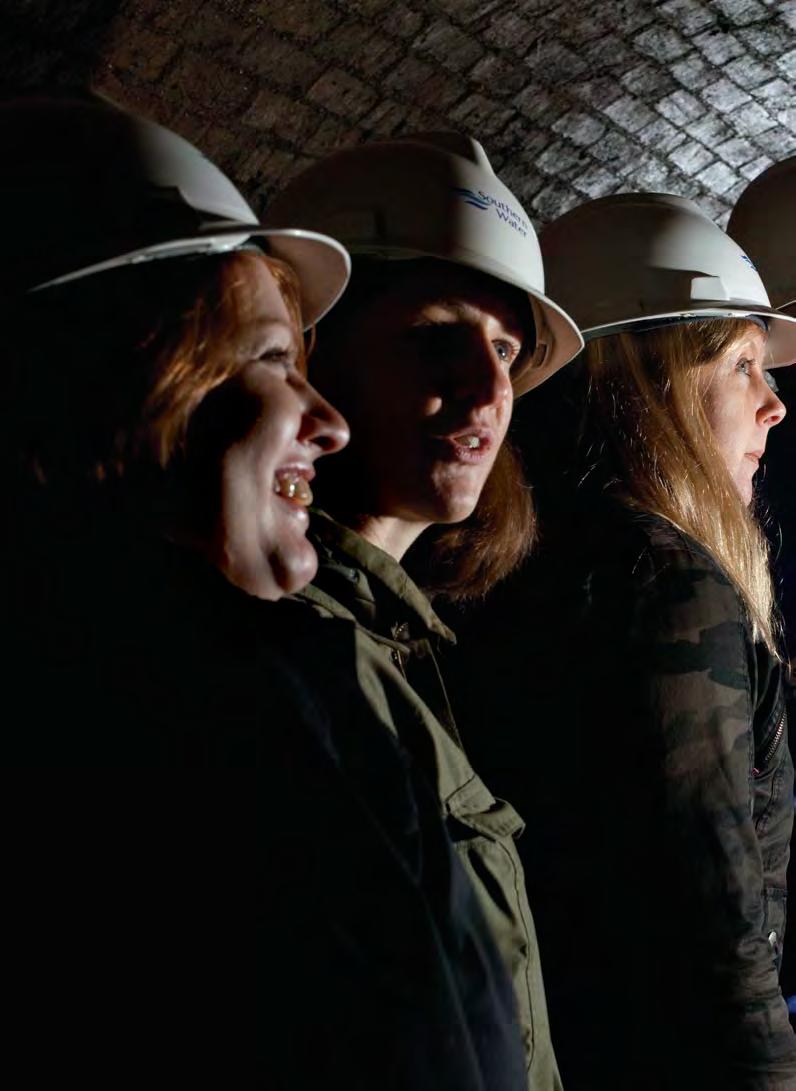
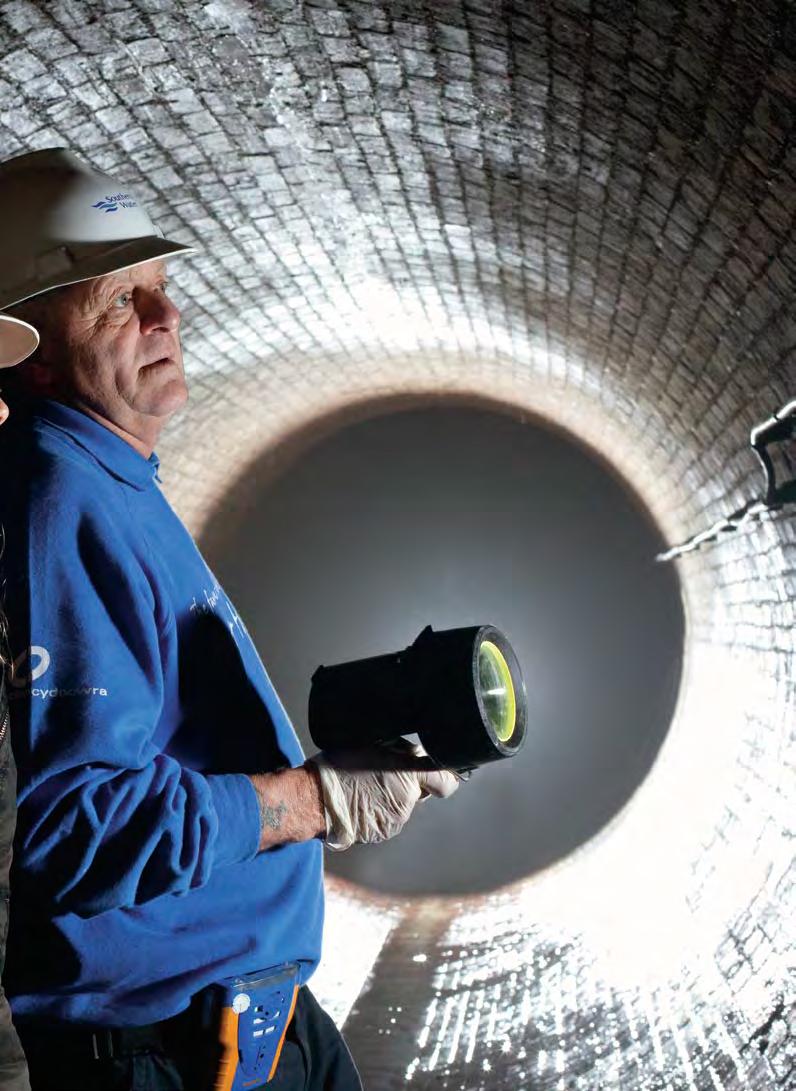

Feeling flush?
the Brighton sewer tour starts here…
Behind a metal door in an underpass close to Brighton pier lies the entrance to another world—a smelly, dangerous world, haunted by rats. Every year some 2,000 people take a tour of the city’s sewers that fully engages all the senses.
Southern Water engineers lead visitors 160 yards up a storm drain, a couple of feet past a brown torrent of gunk produced by Brighton’s residents, and underneath a weir that, if a storm breaks, will overflow with sewage that could carry you away in a stinky flood.
Of course, Southern has alarm systems and other procedures in place to assure your safety, but there is certainly an air of danger. Maybe it’s the dark, maybe it’s the austere Victorian brick tunnels. Or maybe it’s the rats. “They normally scarper when they see our lights,” the guide says. Without doubt, one of the most perversely enjoyable guided tours in the country. tours take place from May to september. Contact southern Water at sewer.tours.southern water.co.uk. tickets: £12 for adults. For other Brighton walks, see brightonwalks.com
For many visitors, the word Liverpool represents one thing: The Beatles. Naturally, there are always coachloads craning to see Strawberry Field or the recently opened McCartney family home. But there is so much more to the city, which boasts the highest number of Grade II-listed buildings outside London and has Unesco World Heritage status as a Maritime Mercantile City, thanks to its iconic waterfront. The Royal Institute of British Architects organises tours around Liverpool’s grand and often pioneering architecture, recounting not just the history of the buildings but also how they reflect the city’s past as a major international port. The Gateway to the World Walk, for example, looks at the “Three Graces”—the Royal Liver Building, the Port of Liverpool Building and the Cunard Building—which give Liverpool its distinctive skyline. Sometimes tours have access to interiors of buildings, such as Martins Bank, which held much of Britain’s gold bullion in its vaults during the war. riBA Liverpool City tours run several times weekly; £7.50 for adults (architecture.com/ liverpoolcitytours; 0151 707 0729)


Lots of cities now offer “free” tours, many of which turn out not to be free at all (you are expected to tip heavily or pay what you think it’s been worth—always horribly awkward). But this tour, which has its origins in the 1930s, is a true bargain. Guides won’t even accept a tip Specially trained volunteers, known as The Mayor of Bath’s Corps of Honorary Guides, conduct tours around the city every day except Christmas Day and in all weathers. Their boast is that they’ve cancelled just twice in almost 70 years— once when the ground was too slippery because of ice, and the other time when a hurricane-force wind blew its way
through the city). The tour takes around two hours and includes all the essential sights in this Unesco World Heritage Site with its brilliantly preserved Georgian architecture—the Pump Room, Royal Crescent, Pulteney Bridge and more.
The tours are a service, say the mayor’s office, that the city is “proud to provide”. Volunteers get a yearly knees-up dinner from the mayor in payment. They also provide an occasional series of more eclectic walks (again free), such as the Jane Austen in Bath tour. tours take place daily at 10.30am and 2pm (saturdays 10.30am only). Meet outside the Pump room. ►
Some tours are too interesting to leave to tourists, and the Houses of Parliament tour is a case in point. It’s easy to forget that the building is so soaked in history. Tours start at Westminster Hall—900 years old and scene of a dizzying number of events, from the trial of William Wallace to the lying-in-state of the Queen Mother. Oh, and President Obama’s speech in 2011. This is followed by visits to the Lords and the Commons, the Royal Robing Room and all the labyrinthine corridors and richly decorated rooms in between.
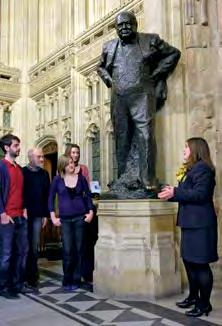
Visitors are taken through the history of the building and our democratic process (many overseas visitors who don’t have this at home become almost tearful at the idea). Quirky details are the door to the Commons worn away by Black Rod and his ceremonial knocking and the statue outside of Winston Churchill; the tradition is that new MPs touch the foot to give them luck before their maiden speech—a habit that’s been discouraged recently due to wear and tear!
For details, go to parliament.uk/visiting. to book, go to ticketmaster.co.uk/ housesofparliament or call 0844 847 1672. tickets: £16.50 for adults; £14 for seniors; free for children under five
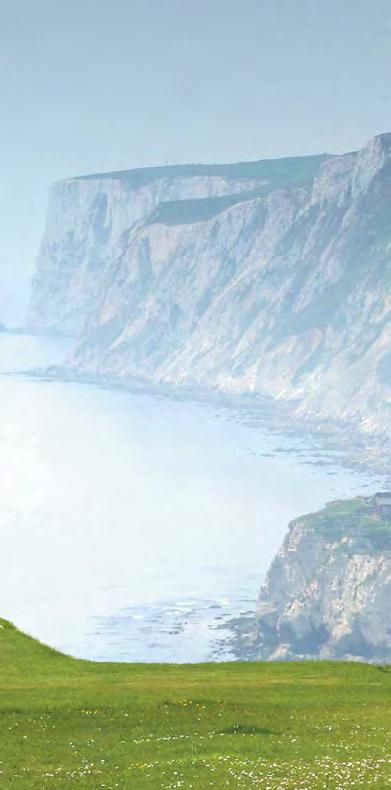
The Isle of Wight claims to hold the biggest walking festival in Europe—and who are we to argue? In fact, it’s become so successful that they now do it twice: once in spring and again for a long weekend in October with close on 100 guided walks over four days.
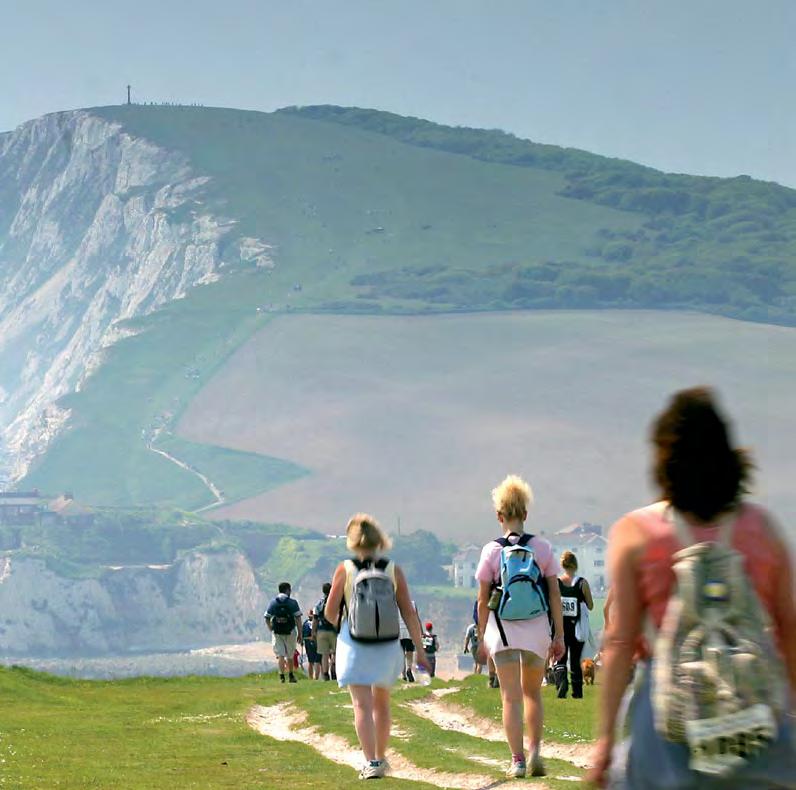
There’s no shortage of choice; there are dinosaur-related or fossil walks, strolls over the National Trust-owned Tennyson Down (where the poet rambled during the four decades he lived here) and the legendary Speed Dating Walk, which boasts five marriages to date.
Those taking part walk from Sandown to Shanklin (about a mile and half) and swap partners, so to speak, every five minutes.
There’s no age limit and all are welcome— but potential dating walkers must register so that numbers balance out. Apparently, men always enrol at the last minute, so are “especially welcome”. Enough said. the festival runs from October 25 to 28 (isleofwightwalkingfestival.co.uk). Many walks are free, some ask for a donation. the speed Dating Walk is on October 27 (£5 to register; £12 for lunch) ►
spooked: harry Collett explores the dark side of Whitby
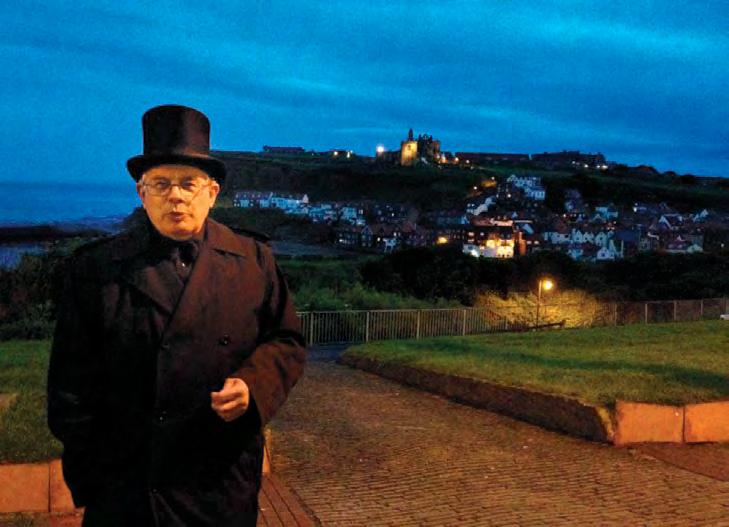
Ghost walks never wane in popularity: the Jack the Ripper Walk, for example, which takes place every night in the Whitechapel district of east London, is still the most popular walking tour in the capital.
Whitby, though, is the perfect place for a spot of ghost bothering. It’s an atmospheric town, what with its gothic architecture, ruined abbey overlooking the bay and, of course, its links with Bram Stoker, who set his novel Dracula here.
So the town does lure those interested in the darker side of life: at Halloween, famously, Goths and fans of anything gothic congregate here from all
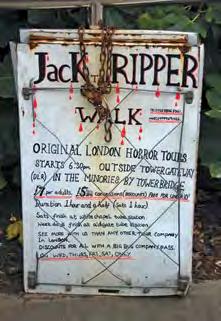
over the world. On offer all year is a Ghost Walk and a Dracula walk, both theatrically conducted by local resident Harry Collett, who dresses as “the man in black” for the tour, and who has his tongue firmly located in his cheek when he promises “tales of the strange and supernatural in the alleyways and snickets of the West Cliff”.
Tours take place at 8pm; in summer, expect spectacular views as the sun sets.
the Whitby Ghost Walk and in search of Dracula tour take place several times a week and cost £5 (whitbywalks.com).
For details of the Jack the ripper Walk in London (£9 for adults), go to walks.com
Walking and drinking is a marriage made in heaven and that’s the idea behind the Edinburgh literary pub tour. Here, a duo of trained actors perform pieces on Scottish writers and their watering holes while you sup, say, a whisky (the tour doesn’t include the booze). In two hours the thesps cover some 14 writers—from Walter Scott to Iain Banks, who died recently—and 300 years of Scottish history. This is against a backdrop of boozers in Edinburgh’s Old Town and starts at the Beehive Inn, at whose bar both Burns and Wordsworth are reputed to have stood.



For those of a different literary bent, the Rebus tours (based on Ian Rankin’s detective novels) are approved by the author and look at the dark, hidden, “alternative” Edinburgh represented in Rankin’s stories. the tour takes place daily during summer, and from thursday to sunday in October; £14 for adults (edinburghliterarypubtour.co.uk). the weekly rebus tours cost £10 for adults (rebustours.com/tours) n
In this case, the guide comes to you—and usually very early in the morning. Peter Cowdrey and Rosie Johnston are birdsong experts (but also, respectively, a composer and opera director) who will join you on your favourite walk, wherever it happens to be, and identify the birds on the route, as well as give tips on recognising calls. A song thrush repeats notes and phrases, Peter explains, whereas blackbirds are melodic and mellow, and the great tit sounds like a bicycle pump. “The walks are a way of looking at and mapping your own landscape,” Peter says. Peter and Rosie will travel anywhere in the UK to lead birdsong walks. Price from £30 an hour, not including travel expenses. Contact Peter Cowdrey on 07855 822091 (theconferenceofbirds.com) n
If you know of a better guided walk than the ones we’ve mentioned here, we’d love to hear about it. Send us an email—with a picture if possible —to theeditor@ readersdigest.co.uk.
Special thanks to Simon Hemelryk who reviewed the Brighton Sewer Tour. Thanks also to Blue Badge Guide Linda Dyke. Liquid inspiration: get a taste of rebus’s edinburgh

When temptation is put in front of us, would we do the right thing?
Our global walletdrop test uncovers the truth
 photographed by Kathrin h arms
photographed by Kathrin h arms
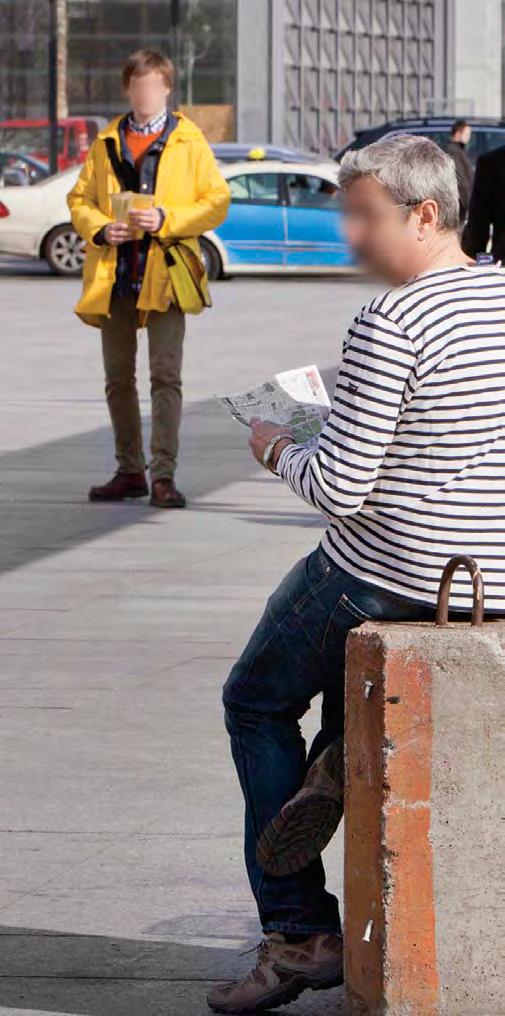
If you lost a wallet in a London street, do you reckon anyone would pick it up and return it? Probably not. But is that assumption fair? And how does our capital’s honesty compare with other world cities? To find out, our reporters “dropped” 12 wallets in 16 cities across Europe, South and North America, and India. In each, we put a name with a mobilephone number, a family photo, coupons, business cards and the equivalent of £30. Then we watched to see what would happen—and if anyone would phone us to give our “lost” property back. ►
So who came last in our honesty league? LIsbon —just one of the 12 wallets we dropped in the Portuguese capital was returned —and that was by a couple from the Netherlands.
Madr I d and Prague didn’t do much better, with only two and three wallets respectively returned in each city.
Two young teenagers walking through a suburban housing estate were among the many less-than-trustworthy residents of the Czech capital. When they came across a wallet we’d left on a bench, the boy, in orange jacket and baggy jeans, whispered to his female companion, sat down and let his bag fall over our item. The girl stood behind him, fished out the wallet and put it into her rucksack. They left in a very good mood.
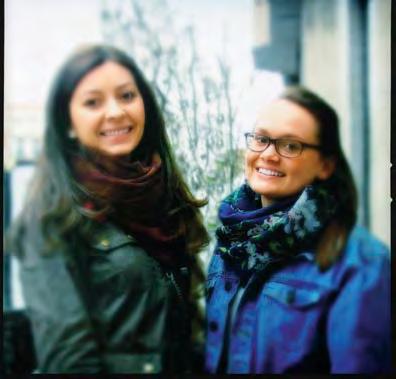
Lena and Beatriz, two students in Madrid, returned our
In Zur Ich , a tram driver in his early fifties, from public-transport company VBZ, found a wallet near the main station. After taking a good look at the contents, he pocketed it and we never heard from him again. This despite the fact that VBZ is in charge of the city’s lost-property office, and citizens are encouraged to hand items to transit staff.
Meanwhile, a woman in her Seventies picked up a wallet dropped near Paseo de la Castellana, a posh area of Madrid full of boulevards and museums. She took the money, threw the wallet away and walked off without looking back.
Still, at least there was some hope in Madrid—a wallet handed in to a policeman was returned.
In b ucharest, Emil Avram, 45, and his son Cosmin, 23, found and gave back one of our wallets outside a shopping centre. “I’d have returned it even if I was without my father,” says Cosmin. “I learned about being a man from home, and from places I’ve worked in.”
But in the city’s university area, a woman in her mid-twenties with a black ponytail picked up the wallet, asked two
“ b ritons justify their actions by telling themselves things like, ‘other people would keep the wallet, so why shouldn’t I?’
—M
people if they’d lost it, then headed for a tube station. That was the last we saw of her—as in Zurich, eight of 12 wallets disappeared in the Romanian capital.
Over to South America and the Brazilian city of rIo de Jane I ro. In a commercial area, a well-dressed woman in her late twenties found a phone, called our reporters’ mobile number and agreed to meet them. But she returned the wallet without any money inside.
Rio scored a paltry four out of 12 in our honesty test, though some citizens did redeem their city’s reputation a little. In upmarket Ipanema, 73-year-old Delma Monteiro Brandão was on her way to pick up her granddaughter from school when she picked a wallet off the ground and gave us a call.
“This is not mine!” she said when we ask her why she’d returned it. “When I was in my teens, I picked up a magazine in a department store and left without paying,” she recalls. “When my mother found out, she told me this behaviour was unacceptable.” Delma had to return to the store, apologise and give the magazine back—obviously a good lesson.
it—even though some of her colleagues in the lab told her not to bother.
And in London , Ursula Smist, 35, who came to Britain from Poland eight years ago, took the wallet she found outside the Shepherd’s Bush Empire to her boss at a local restaurant, and she left a message on our phone. Eva Michalik, who fled communist Poland 40 years
►

In London, Ursula handed the wallet to her boss, who then gave us a call
Of the seven wallets taken by people in WarsaW, mysteriously, all were pocketed by women. But before you jump to the conclusion that Polish women have ethical issues, 28-year-old biotechnologist Marlena Kamínska, who found our wallet at a bus stop, returned photographed by
“If you find money, you can’t assume it belongs to a rich man. It might be the last bit of money a mother has to feed her family” —
ago, told our reporter. “If you find money, you can’t assume it belongs to a rich man. It might be the last bit of money a mother has to feed her family.”
Meanwhile, two workers who found the wallet at a nearby Balfour Beatty construction site told us, “We gave the money back because we know what it’s like to get up in the morning and work hard. Actually, we don’t work hard, but we do get up in the morning.”

Overall, though, Londoners returned an uninspiring five of our 12 wallets (down from a similar test we did in 1996, when the figure was seven out of ten). One lad in a hoodie picked the wallet up from outside a Notting Hill branch of Boots, clocked the money, walked into McDonald’s and emerged with a burger, never to be heard from again. Close by, two chic middleaged men in a very expensive residential street did nothing more than chuckle and disappear around a corner when they found our cash—even though it’s fair to assume they didn’t need it.
By contrast, outside the main courthouse in L J ub LJana , 21-yearold student Manca Smolej didn’t think twice about phoning us to return our wallet. “Once I lost an entire bag but
I got everything back. So I know what it feels like.”
Around half of the Slovenian capital’s residents apparently couldn’t resist temptation, though. One middle-aged man found a wallet in a car park, jumped into his £25,000 Mazda CX-5 and drove off.
In Potsdamer Platz, b er LI n , 46-year-old Adel Ben Salem was about to start his shift as a chauffeur at the Ritz Carlton when he found and returned the wallet.
“I saw the photo of the mother with her child,” he said. “Whatever else is important, a photograph like that means something to the owner.”
Six out of 12 Berlin wallets were returned, but aM sterda M and MoscoW went one better. Angelique
“several Western countries haven’t done well in the test, possibly because some people in richer nations have less respect for money and goods”
—M I ke b erry
Monsieurs was cycling through the Dutch city when she saw a woman drop her wallet as she walked into a supermarket. Angelique picked it up, then sat back on her bike sipping a coffee until our reporter came out again.
Angelique, 42, was on sick leave and could perhaps have used our cash, but gave it back because, “You never know what the owner’s situation is. Maybe he desperately needs the money.”
A young lady called Ekaterina, who handed back a wallet at Moscow Zoo, had a similarly altruistic attitude. “I’m convinced that people should help one another, and if I can make someone a little happier, I will.”
Near a mall in downtown b udaPest, Regina Györfi, 17, put down her bag and violin case when she saw our wallet, picked it up, looked through it and called the mobile number immediately.
“I remember being in a car when my dad noticed a wallet by the side of the road,” she says. “The owner was very grateful. Without the papers [inside] he’d have had to postpone his wedding, which was to take place the same day!”
Tying with b udaPest

For Reino and Kaija of Helsinki, honesty comes naturally for third place in our honesty test was n e W york , with eight out 12 wallets returned.
Michael Lupanucci, a 46-year-old teacher who helped return our wallet in Central Park, had faith in his fellow New Yorkers. “It’s so easy to be cynical,” he said. “But especially after 9/11…that instilled companionship in everyone.”
the honest League oF natIons
Walle TS
reTurned/12
Hel SI nkI 11
Mu M baI 9
b udape ST 8
n e W YOrk 8
M OScOW 7
aMSTerdaM 7
b erlI n 6
l jubl jana 6
lOndOn 5
WarSaW 5
b ucHare ST
rIO de jane I rO
Zur IcH 4
prague
MadrI d 2
lIS bOn
The people of Mu M baI came second in our survey.
“My conscience wouldn’t let me do anything wrong,” says Rahul Rai, 27, a video editor at a Mumbai production company, who returned one of nine wallets we got back. “A wallet is a big thing with many important documents [in it].”
It’s just a shame that India’s judicial system didn’t live up to the occasion. A wallet we “lost” outside Bombay
high court was given to a court official by a lawyer, but never reappeared.
“Finns are naturally honest, it’s typical for us,” said 27-year-old business student Lasse Luomakoski. The neatly dressed young man found and returned our wallet in downtown h e L sI nkI . “We are a small, quiet, close-knit community. We have little corruption and we don’t even jump red lights,” he says.
“Of course we returned the wallet,” says Reino Lempinen, in the working-class area of Kallio after he and his partner, both in their sixties, reunited us with our cash. “Honesty comes naturally to me, since I’m a small-town boy.”
Kaija, looking sweetly at Reino, adds, “After all, we’ve promised to be honest with each other too.”
The loved-up couple gave back one of 11 out of 12 wallets dropped in the ultratrustworthy Finnish capital—our honestytest champion!
Of the 192 wallets dropped worldwide, 90 were returned—47 per cent. But age and gender seemed to have no real impact on whether people did the right thing—and neither did wealth. People in Moscow returned seven wallets whereas the more prosperous city of Zurich managed only four.
Some decry immigrants as a source of crime, but they were, on average, just as honest as the natives. Typical was an elderly Moroccan gentleman in Amsterdam, M Djermouni. “They always say that Moroccans are thieves and pickpockets. But old Moroccans are honest, believe me, and I’m an old Moroccan.”
The most profound conclusion we’ve come to is that, as 50-year-old Finn, Outi Pyy, put it: “It’s not really about the place or the city.” There are, it seems, dishonest—and very honest— people of every nationality, everywhere you go. n
Life at the sharp end of customer service can be tough, as the true stories at notalwaysright.com illustrate.
(A customer is paying for her order at the cash till.)
Manager: “Will that be debit or credit card?”
Customer: “Debit.”
Manager: “Would you like to leave a tip?”

Customer: “HOW DARE YOU! If I wanted to leave a tip, I’d have left it on the table. That’s so rude of you to ask!”
Manager: “No, madam, that’s not what I mean. The computer is asking if you want to leave a tip.”
Customer: “Oh, so computers talk now, huh? Just like how the roof talks. And the floors too. You’re just full of it!”

Home. It’s important to our identity, our independence, our wellbeing. Most people would like to stay in their own homes for as long as possible. But as we grow older, health problems can be a worry and sometimes it’s a struggle to keep up with repairs or pay the bills.
When you donate your home to Age UK through the Gifted Housing Service you’ll enjoy all the benefits of home ownership without the anxiety. Set up 35 years ago, this unique scheme helps you live in your own home for longer.
To request our leaflet please call: 0800 389 5295 or 01225 447800
Under the Gifted Housing Service we will:
• cover the cost of Council Tax, water rates and buildings insurance
• arrange and pay for most maintenance, upkeep and improvements with your agreement
• help arrange and pay a contribution towards your care at home or elsewhere should you need it
• provide support to help you stay in your home for longer.
Or write to: Age UK Gifted Housing Service, FREEPOST (SWB10997) Bath BA2 3ZZ, quoting RDOCT13 www.ageuk.org.uk/gifted-housing
After surviving a cancer scare, a Liverpool kidney surgeon vowed to make a difference to the world—and now he’s bringing hope to Palestinian children
words and pictures by craig stennett
Four doctors from Liverpool are being driven fast across the Sinai desert. The area has a reputation for lawlessness and the many military checkpoints bristle with heavy machine guns. The team, all from Liverpool University Hospital’s transplant unit, pass numerous Egyptian tanks and armoured cars. They also know about the recent series of kidnappings that have taken place along the route—known ►


“I wanted to do more good”: Dr Abdul Hammad with nine-year-old Fatma Othman

as “Saladin’s Road”, after the 12thcentury Muslim leader who defeated the Crusaders.
The surgeons, led by Dr Abdul Hammad, are on their way to the border crossing of Rafah. From there, they’ll enter the Gaza Strip, where their mission is to carry out the first-ever kidney transplants on Gazan children.
On reaching the crossing, Dr Hammad immediately heads for the drinks fridge of a nearby cafe. His urgency has nothing to do with thirst. Since he left Liverpool 36 hours earlier, he’s been carrying a supply of Campath—a drug that, because it helps to prevent the immune system from attacking transplanted organs, is vital for the success of his surgery. But it’s also a drug that needs to be kept cool—not easy in the desert.
Dr Hammad, 57, was born in Iraq, but he’s been living and working as a British citizen on Merseyside for more than 25 years. He projects the calmness and quiet sense of purpose you’d expect of a leading transplant surgeon. Yet five years ago, his life took a very different path.
“I was diagnosed with bowel cancer,” he says. “As a doctor I knew the statistics about the likelihood of my survival. The first thing I thought was that I wouldn’t see my two children graduate. The second was: Have I missed the opportunity to do something with my life? As I went through the chemotherapy and surgery to remove the cancer, I realised that if I did survive I wanted to make a bigger contribution to the world. I wanted to do more good. So when I was approached by an anaesthetist from the Shifa [the
biggest public hospital in the Gaza Strip] I decided to get involved.”
The anaesthetist wanted Dr Hammad to go to the Shifa and carry out transplants there. The local doctors had never done them and, just to make it harder, the hospital didn’t have all the necessary drugs and equipment.
“Being on dialysis and needing a kidney transplant is debilitating enough anywhere,” he explains as he crosses the last few yards into Palestinian territory, “but in Gaza it’s another level of suffering. During the war years kidney patients died because they couldn’t get to the hospitals for dialysis. The health care system was in crisis. The war absorbed so many resources that everything else had to be put on hold.”

Now Dr Hammad and his colleagues from Liverpool—Dr Adham Al Bakri, Dr Sanjay Mehra and Professor Derek Middleton—intend to bring hope to Gaza’s 500 or so dialysis patients, 60 of whom are children. This is his third visit and the second time he’s performed surgery. Six months earlier his team carried out the first kidney transplant in Gaza’s history. ►
“in the gaza strip it’s another level of suffering”
“This boy is a fighter”: Abdel Motalib Awad is examined before surgery; and, right, begins to recover afterwards

One of the first patients on this visit is Abdel Motalib Awad. Aged nine, Abdel suffers from Bartter syndrome, a genetic defect that has caused profound deafness and kidney failure almost from birth. Dr Hammad and Dr Mehra exchange concerned looks as they examine him for the following day’s surgery. “If we don’t operate on this little boy, he’s not going to last another six months,” says Dr Hammad. Out of earshot of the boy’s family he adds, “Nearly all his veins have collapsed from the dialysis. There’s practically nothing left to get a line into him.”
The two agree that a kidney transplant is Abdel’s last and only chance. The donor will be his mother Sharifah, who’s been tested and is a nearperfect match—one thing, at least, in his favour.
Next, the doctors meet a radiant, bubbly nineyear-old girl called Fatma Othman, who sits up in
bed beaming out a smile of welcome as the surgeons approach. She’s been on dialysis for the past two months and confides to Dr Hammad in a half-whisper that she hasn’t let any of her friends at school know. Her new kidney is also being donated by her mother, whose name is Marwa. After a brief examination and a final check of the medical notes, the team’s preparatory work is finished for the day.
Early the next morning Abdel is brought into the operating theatre and sedated. Next door, his mother has already been in surgery for several hours. As Dr Mehra and Dr Al Bakri remove her kidney, they’re assisted by Shifa’s own surgeons, keen to learn the techniques and intricacies of this kind of

Despite the difficulties, Dr Hammad refuses to compromise on the quality of his work

operation. The doctors from Liverpool are aware that the hospital is a far cry from what they’re used to—and that medical supplies are often in short supply—but they’re determined not to compromise on quality.
Seven hours later, and Abdel’s new kidney has been successfully implanted. Dr Hammad’s sense of relief is palpable and he allows himself a quiet smile: “This little boy is a fighter. His arm was swollen from the dialysis and I was worried about the outcome. In fact, I hadn’t slept at all, but it’s gone well. This is what we’re in this profession for, and this is why we’re in Gaza. A transplant was this boy’s only chance.”
“if we don’t operate, he’s not going to last six months”
anaesthetic in the recovery ward, his relieved father sits beside his bed. Using sign language, he tells his son that everything will be all right now and that he won’t need to have dialysis any more. “My son suffered terribly with his veins from the dialysis. His whole arm had swollen up as one of his last veins started to collapse. We’re so happy—and my wife is so proud that she’s been able to give a kidney to him.”
As Abdel slowly wakes up from the
And then he bursts out: “I want to hold a party for the dialysis department. And when my son returns home, our family will have a party to celebrate as well!” ►

Dr Hammad’s long-term aim is to train local doctors and nurses to do organ-transplant operations themselves—to “go solo”, as he puts it. A team from the Shifa will visit Liverpool next month to begin to get the necessary skills. “The best treatment for kidney failure is kidney transplant,” says Dr Hammad. “It immeasurably improves and extends the life of the patient. And the important thing is that we’re helping the staff here to establish a permanent renal transplantation unit. I can come and do transplants, but it isn’t a long-term option. The solution is to have trained surgeons in Gaza.” Luckily, the Health Ministry agrees. “They’re very supportive of us,” he says.
On the day after Abdel’s operation, it’s Fatma’s turn. With the team buoyed by yesterday’s success, the atmosphere seems more relaxed.
As the girl sits on the operating table, Dr Hammad carefully and gently explains how she’ll soon be falling asleep and can look forward to having a new kidney when she wakes up. The operation progresses according to plan—and is nearly over when the electricity fails. Power cuts are a regular feature of life in the Gaza Strip, and could be a disaster for anyone in the middle of surgery. But the staff have become old hands at coping with them. The independent generators immediately kick in and, while the other


rooms plunge into darkness, the lights in surgery stay on. Only the air conditioning fails.
Some time later, when he’s making his night rounds, Dr Hammad approaches Fatma’s bed. She opens her eyes and beams out another broad smile before drifting back into sleep.
they’ve become old hands at coping with power cuts
But there’s one more thing for Dr Hammad to do before his ten-day visit can be considered a complete success. “Live kidney donors alone won’t be
sufficient to solve the problem here,” he says.
“There aren’t enough. There needs to be a change in the law so that donations can be made available after death”— something that doesn’t happen at the moment.
And so he approaches the health minister, Dr Mufid al-Makhalalati, with this idea and requests something extraordinary: permission to address the Palestinian Legislative Council, the government of the Gaza Strip.
On the day of the council meeting,
►

Donors needed: Dr Hammad meets the Palestinian Legislative Council in Gaza
◄ our team to come to Gaza and do this surgery. But addressing the council and getting the decision was the first time I thought, maybe I was saved from cancer just for the success of today.” n
greetings are exchanged over coffee before the formal business begins. The session is surprisingly short. Supported by the health minister, Dr Hammad outlines his arguments—and, after some discussion and points of clarification, it’s soon agreed that there’s no reason why organs can’t be donated after death, as they are already in other Muslim nations such as Saudi Arabia and Egypt.
As we leave the parliament building Dr Hammad says, “You know, I am actually the front man for a lot of people who make it possible for



Would you like to downsize, release capital and be able to make the most of your leisure time...
You could move to a beautiful location and have a new detached home with a high-spec interior, that’s a delight to live in and easy to maintain. Its simpler than you think with The Park Life Group - with over 50 parks across 17 counties. People from all walks of life choose to live in a park home, or buy one as a second home, and become part of a friendly community.
With almost 70 years of excellence, The Park Life Group offers remarkable value for money and superb customer service. Call us today for more details on our stunning homes and plots available across the country, come and see for yourself at one of our Open Days and go to www.parklifegroup.com for more information.
Two

Two



Please Note: Library Photographs may have been used in this advertisement, merely to depict the make or model of home for sale.
These are just some of the homes available at our parks across the country
Come and see for yourself at one of our Open Days and go to www.parklifegroup.com for more details.
Open weekends:
Takeley Park - 21 & 22 SEP
Takeley Park, Takeley, CM22 6TD
Wickham Court - 21 & 22 SEP
Fareham, Hants PO17 6JS
Westgate Park - 21 & 22 SEP
Westgate, Sleaford, NG34 7QP
Truro Heights - 28 & 29 SEP
Kenwyh Hill, Truro, TR1 3DY
Tregatillian Park - 28 & 29 SEP
St Columb Major, TR9 6JL
Thornlea Park - 28 & 29 SEP
Littlehampton, West Sussex BN17 7QD
Hedge Barton Park - 28 & 29 SEP
Fordcombe, Tunbridge Wells, Kent TN3 0SL
Radwell Court - 5 & 6 OCT
Radwell, Bedfordshire, MK43 7HS
Folly Park - 5 & 6 OCT
Clapham, Bedfordshire MK41 6AL
Peppercorn Park - 5 & 6 OCT
Clapham, Bedfordshire MK41 6HB
Rymer Point Park - 12 & 13 OCT
Barnham, Nr Bury St Edmunds IP24 2PY
Waterbeach Park - 12 & 13 OCT
Denny End Road, Waterbeach CB25 9PF
Cotswold Manor - 12 & 13 OCT
Stratford Bridge, Ripple, GL20 6HE
Cheltenham Spa Parks -12 & 13 OCT
Bamfurlong Lane, Staverton, GL51 6TD
Regency Court - 12 & 13 OCT
Allhallows-on-sea, Rochester, ME3 9TD
Takeley Park - 19 & 20 OCT
Takeley Park, Takeley, CM22 6TD
Wickham Court - 19 & 20 OCT
Fareham, Hants PO17 6JS
Westgate Park - 19 & 20 OCT
Westgate, Sleaford, NG34 7QP
Exclusive park homes or development plots available to design your own home. Homes Available from £89,995
Part Exchange Available:
Solicitor and Agents fees paid.
Part Exchange Example:
Park Home Price: £129,950
House Price: £200,000
Cash to you: £70,050
LINES OPEN 7 DAYS A WEEK 01242 30

…our first family house wasn’t a house, it was my grandmother’s newsagent’s in Hackney. The downstairs parlour was always full of newspapers and copies of Punch. My parents Leslie and Phyllis soon moved to their own place in South Woodford.
…loving a series of leatherbound volumes called The Children’s Encyclopaedia, at my friend Susan’s house. One of my earliest memories is reaching up and pulling the books down. There might be pictures of anything on any page, you know? Submarines, birds, tools or whatever. I think that my sense of education being
about “dipping in” came about through that. I used to find Reader’s Digest very influential for the same reason.
I used to read everything. Bad comics, good comics, even the ingredients on a jar of pimientos. I believe my thinking and attitudes are better for it—not so rarefied.
I have a big problem with the way Michael Gove talks about education. I don’t think he had the best of upbringings, quite honestly—just reading things like Heidi and The Water Babies. To get a really broad understanding, you need to read all the crash-bang-adventure rubbish stuff too.
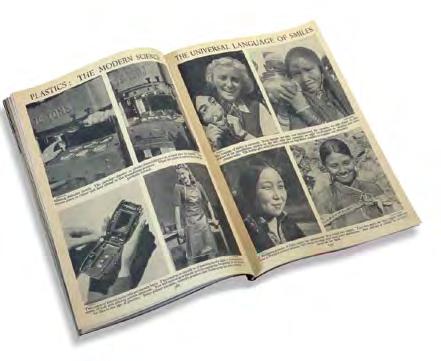
…my parents both absolutely believed in public service. They sent me to Bible class at our C of E church and the pupils went out into the East End and put on concerts and parties for the elderly, and gave them Christmas presents. Nobody did it because it was consciously “a good thing to do”. It was just the appropriate thing to do.
…i was an only child, so i was quite solitary. I had a strong imaginative inner life. People say, “Did you have an imaginary friend?”
I say, “An imaginary friend? One?” I had
“I was an only child, so I was quite solitary”

As
about 27! My mum took me to a specialist when I was eight because she thought I was deaf, but I was just locked away in my own world and wasn’t listening to what she was saying!
At the same time, though, my mum loved amateur dramatics and my dad had been a boogie pianist in the Second World War, so they encouraged the performer in me [at 12, Tony had a role in the first West End production of Oliver!].
…my headmaster encouraging me to pursue professional acting, even though I was still at school. It was a very progressive thing for him to do. So I was away from classes a huge amount doing bit parts in shows, telly and films. Nobody at school really knew where I was supposed to be, so I’d bunk off a lot.


…thinking all men should try drag. After drama school, I had six glorious months in rep at Stoke-on-Trent. It had one of the most radical theatres in the country, the Victoria. I was given the most fantastic parts. In particular, we staged a “history of musicals” show, and for some reason I was given all the drag roles. I suddenly realised
how liberating wearing women’s clothes is. Every man—particularly red-blooded heterosexuals—should spend two years in a dress, rather like going on military service. It’s just such a different way of thinking about and negotiating the world. It didn’t make me wish to take male lovers, but I had such fun coming out in this wig with curls and flouncy dresses, thinking that I was the most glamorous girl in the world.
…the script for the blackadder pilot wasn’t very good. And the first series itself wasn’t great, was it? [Tony got the part of Baldrick in 1983 after several years working in theatre and TV.] The only person who got that the show might bring us fame and fortune was John Lloyd, the producer. I remember going up to Alnwick
“Injustice has always made me angry. Maybe it’s something to do with being little”
in Northumberland for the first batch of filming, and he said to me, “So, how are you going to deal with being famous, then?” And I went, “Wha…?”
Eventually, very reluctantly, we were given a second series. In the first week of rehearsals we all struggled, particularly Miranda Richardson as Queenie, because the show had been penned by two blokes [Richard Curtis and Ben Elton] who didn’t know how to write for women. Then Miranda got this idea that her Queen Elizabeth would be the most powerful woman in the world…who happened to be 14 and on the cusp of ponies and sex. That transformed everything.

nine geniuses and I’m supposed to be the big boy. I always found that very hard.
…getting into politics in the eighties. It was about wanting to be part of the process of my species. I always wanted to feel engaged, whether it was about Oxfam, the first charity I did work for, or the South West Drama Panel, trying to decide who should get grant money [Tony was later vice president of the actors’ union Equity and a member of the Labour Party National Executive Committee].
The first time the second series was shown it did all right, but the second time—whoof! It became huge. It took me quite a while to realise because I was living in Bristol with a wife and two young kids and was devoting most of my life to them.
All those ex-public schoolboys in the cast were terribly nice to me; they had a facility for care and concern that only the truly wealthy are able to deploy. I left school at 16 and didn’t have their literacy or confidence, but they were also ten years younger than me. So I was confronted by
Injustice has always made me angry. Maybe it’s something to do with being little; you see things through the eyes of someone who is physically unable to do some things and can be diminished by others because of their size.
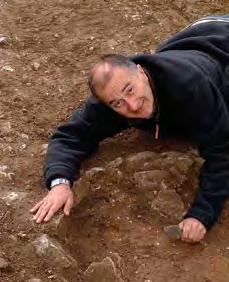
…appreciating the simple magic of Time Team. I mean the fact that buried in your garden there could be echoes of other ►
people who lived there long ago. People watching could have ownership of that. I remember this couple in Northamptonshire who’d been digging a pond for their koi carp and found two Anglo-Saxon bodies. It was just the most exciting thing ever for them.
I loved hearing my dad’s stories about
Protesting outside Parliament: “I always wanted to feel engaged”
through my feelings about my mum’s death? Probably. But then again, that’s what we do in this world.
By the time I was asked to make a film about her [Channel 4’s Me and My Mum, 2006], she had pretty chronic dementia. I never knew what she was taking in. I said to her, “Mum, I’ve been asked to make a film about the kind of illness you’ve got. But also about you, and living with the illness. So it would be your story. How would you feel about that?”

his air force days during the Second World War. He didn’t get lots of medals, but he had those adventures that come when the world is in chaos. It gave me an understanding that mine wasn’t the only time there had ever been—that I was part of the arc of human history.
…the guilt of putting my mother in a home. Have I resolved it? I don’t like the fact that it happened, but there was an inevitability about it—she had Alzheimer’s.
I’m now an ambassador for the Alzheimer’s Society, and although there are good objective reasons why I think that stuff’s important, am I working
She said, “Ooh, yes, fine.” And I thought, Has she really taken it in?
An hour later, she started pinching me, and said, “When’s it going to happen, then?” And I said, “What, Mum?” She said, “You know, that thing—that nice thing.”
I knew at that moment that it would be genuinely good for her. She was the belle of the ball during filming and flirted outrageously with everything in trousers— absolutely disgraceful. How anybody with the same genes as me could be outrageous, I don’t understand! Ha.
…appearing on quesTion Time this year was very scary. It’s one of the hardest things. Russell Brand said recently that you get an enormous feeling of solidarity with the other panellists. He was talking about Melanie Phillips, who is the antithesis of everything I’d imagine that he holds
dear, yet he felt quite an affection for her.
I really understand that. It’s like you’re all about to go over the top. Then you do the programme and you’re knocking bits out of each other, looking as relaxed as you possibly can, thinking as fast as you can. Then you all have a meal together and go, “Cor, that bit was funny, wasn’t it?!”
…developing a lightness of touch. Everything used to matter so much: mattered with a capital M, capital Ts, capital Es. When I said stupid things, I cringed, when I said smart things, I crowed, and when something nice happened I’d think, Am I happy? Am I really really happy?

Now, I enjoy my life much more. It has a series of colours and tones to it. Yes, when I’m sad, of course I’m sad. But I went to a funeral the other day, and I asked somebody (who was also very close to the person who died), “What did you think of the funeral?”
They said, “I really enjoyed it.” And I thought, Yes, that’s the place I like to be. That you can enjoy sorrow.
I still get outraged about injustice. But I’ve learned it’s more effective to walk on my toes, rather than my heels all the time. ■ As told to Ellie Rose
Sir Tony Robinson is supporting 50 years of Dyno-Rod. For more: dyno.com/50.
The rise of smaller parties may be something of a novelty in Britain, but minority movements have more of the spotlight in other countries—and they’ve taken many odd stances:

Deadly Serious Party (Australia): It promised to dispatch a flock of mutated killer penguins to protect the Aussie coastline. Disbanded in 1988 due to lack of members.
Union of Conscientiously Work-Shy Elements (Denmark): Founded in 1979, their policies included Nutella in army field rations and more whales in the fjord of Randers. Amusingly, the party often held the deciding vote in hung parliaments.
The Two-tailed Dog Party (Hungary): Election posters featured candidate István Nagy, a two-tailed dog. Their slogan was, “He’s so cute, surely he doesn’t want to steal.”
The Rent Is Too Damn High Party (US): Self-explanatory. And not really a joke either.
They may be as British as a nice cup of tea, but these traditions, customs and organisations are well past their sell-by date

Before the war, when the tradition started of parties decamping from Westminster to various outposts of Britain, conferences allowed leaders to connect with their membership—then in the millions— in ways they couldn’t without TV and the internet.
But these days, dwindling numbers mean that the membership at large is the membership at small, and conferences are little more than fund-raising, selfaggrandising events costing taxpayers millions for pointless security.
Those who penetrate the ring of steel are the “minted”—the lobbyists, big charities, trade unions, THinking DiffErEnTly! ►

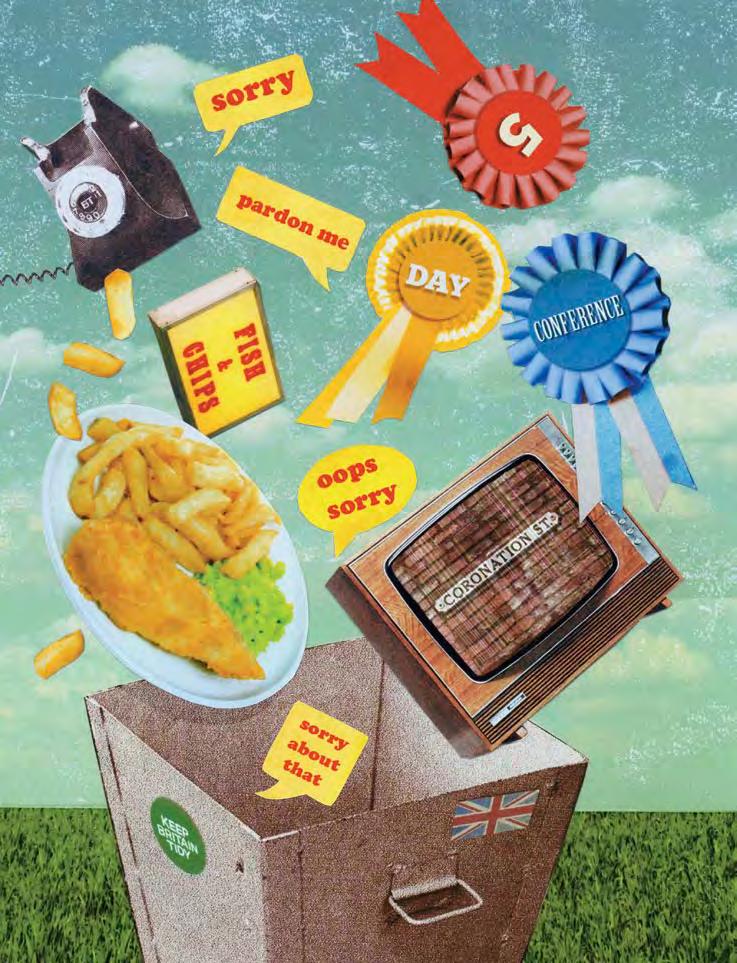
◄ and flabby, tasteless slabs of fish should still represent the pinnacle of our culinary achievements.
arms dealers. But those not getting behind the barbed wire are the voters— the very people the parties should be listening to.
Even the sense of political spectacle has dried up. Speeches are now stuffed full of spectacular mundanity, mendacity and hypocrisy (politicians preaching social order, for example, the night after getting trolleyed in the hotel bar). There aren’t even any Neil Kinnock photo opportunities. The equivalent of him slipping hilariously on Brighton beach just wouldn’t be allowed by today’s riskaverse spin doctors.
bT is a casE of a naTional insTiTuTion bEing fixED THaT wasn’T brokE
Of course, in these days when nostalgia rules, steaming fish ’n’ chips wrapped in Sarson’s-soaked newspaper seems to conjure up a golden era when Britannia ruled the waves. But even when it’s been reinvented as “heritage” fish ’n’ chips, it’s the same mush only with smaller portions and a bigger price tag. For the same cost you could eat a three-course meal at a Paris bistro. l Toby’s book “How to Set Up a Free School” (£1.99 for Kindle) is out now.
American political conventions happen just once every four years and last barely three days. Here, the Liberal Democrats, whose membership could fit in a phone box, annex an entire city for five days. Believe me, five minutes is long enough. l Quentin writes for the “Daily Mail” and is a frequent contributor to Radio 4.

fish ’n’ chiPs
Toby Young, journalist
Given that British cuisine is now among the best—if not the best—in the world, it’s ridiculous that fish ’n’ chips remains our national dish.
Tourists in search of a taste of the real Britain shouldn’t be heading directly for the “chippie”, when astonishingly good food is served in other restaurants all over the country. It seems wrong that soggy, misshapen slices of fried potato

for things that aren’t our fault
Olly Smith, TV presenter and wine expert
The classic example is when someone trips you up in the street and you say, “Ooh, I’m sorry.” Similarly, if somebody spills your drink by nudging you in a bar, the natural British instinct is to turn round and exclaim, “Oh, I do apologise.” Even when you can’t hear somebody properly because they’re mumbling like an ape, the standard response is, “I’m sorry?” Ridiculous!
I’ve heard that Britons apologise some two million times in their lifetime. For an 85-year-old, that’s more than 60 times a day. But excessive apologising is manners fundamentalism, it’s unconstructive and often dishonest. Serial offenders should be made to promise formally that
they’ll never apologise for something that isn’t their fault ever again. Without apologising, of course.
l Olly’s latest book “Behind Enemy Wines” (£7.99) is available exclusively from ollysmith.com.

Kevin McNally, actor
It was a bad turning point in British TV when our primetime programmes became these shoddy, visually dull productions with ludicrous storylines.
In the US, they’re watching Breaking Bad or The Walking Dead. But our gold standard of evening TV is programmes where the actors don’t do much apart from shout at each other. Yes, the likes of EastEnders get good ratings—although not nearly as high as they used to—but they’ve hijacked places in our schedules that used to be filled by high-class drama. In the US, soaps go out in the afternoon.

Alistair Moffat, author
What used to be the reliable old Post Office, owned by the people for the people, has become an impersonal, inefficient company. I live in the hills near Selkirk, and when the phone line breaks down or is crackly, as it is most winters, it’s very difficult to get someone to fix it.
Join the debate at facebook.com/ readersdigestuk or email readersletters@ readersdigest. co.uk
I have the strong impression that BT doesn’t care about customers in the countryside or with problems. The big change was privatisation, with BT now being run for profit. When it was part of the Post Office, the guy who came to install the phone in my farmhouse was an engineer I’d known from school. It was like any other service, such as a plumber or electrician. You could talk to them. Not so much these days.
Coronation Street in its heyday was witty and funny, but it isn’t now. I think soaps’ attempts to tackle social issues these days are rather pretentious, actually. They’re not very good at it, it’s always black and white, and they very often get it wrong and offend somebody.
I see that this store really pushed the boat out with their sale prices!
Many thanks to Craig Hobson of Rugby, Warwickshire, for sending this in
And their billing is lethal! Our post can be erratic, but I’ve twice had a final demand before I’ve had the original bill—and even been cut off as a result. BT is a case of a national institution being fixed that wasn’t broken…and now it is.
l Alastair’s book “The British: A Genetic Journey” (£16.99) is out this month n
As told to Daphne Lockyer and Ellie Rose
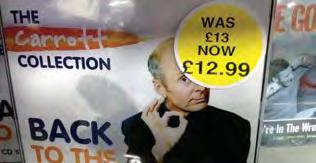

When she was 17, Juliane Koepcke dropped
10,000 feet into the Amazon rainforest. She describes how she survived— alone

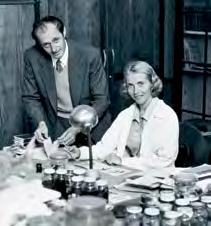
Juliane Koepcke grew up in Lima, Peru, before moving, at 14, to the Peruvian rainforest, where her parents Maria and Hans-Wilhelm Koepcke established the Panguana Ecological Research Station. After two years of accompanying them on research trips into the jungle, Juliane returned to Lima to complete high school.
On December 24, 1971, Juliane, 17, and her mother boarded a flight in Lima bound for Pucallpa, the city with an airport closest to Panguana, to visit her father for Christmas. In her own words:
My days in Lima are wonderful. Despite my jungle experience, I am a schoolgirl. I spend my vacations in Panguana and my school days with classmates in Lima.
My mother prefers to fly to Pucallpa earlier, but a school dance and my high school graduation ceremony are on December 22 and 23 respectively. I beg my mother to let me attend.
“All right,” she said. “We’ll fly on the 24th.” The airport is packed when we arrive on the morning of Christmas Eve. Several flights had been cancelled the day before, and hundreds of people are now crowding the ticket counters.
Mother doesn’t like flying. She’s an ornithologist and says it’s unnatural that a bird made of metal takes off into the air.
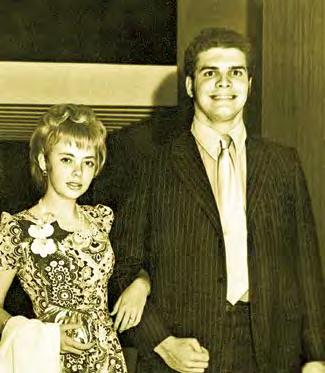
The first half of the hour-long flight from Lima to Pucallpa is uneventful. We’re served a sandwich and a drink for breakfast. Ten minutes later, as the flight attendants begin to clean up, we fly into a huge thunderstorm.
two days before the ill-fated flight
At about 11am, we gather for boarding. My mother and I sit in the second-tolast row on a three-seat bench. I’m by the window as always; my mother sits beside me; a heavyset man sits in the aisle seat.
Suddenly, daylight turns to night and lightning flashes from all directions. People gasp as the plane shakes violently. Bags, wrapped gifts and clothing fall from overhead lockers. Sandwich trays soar through the air, and half-finished drinks spill onto passengers’ heads. People scream and cry.
“Hopefully this will go all right,” my mother says nervously.
I see a blinding white light over the
right wing. I don’t know whether it’s a flash of lightning or an explosion. I lose all sense of time. The airplane begins to nosedive. From my seat in the back, I can see down the aisle into the cockpit.
My ears, my head, my whole body are filled with the deep roar of the plane. Over everything, I hear my mother say calmly, “Now it’s all over.”
We’re falling fast. People’s shouts and the roar of the turbines suddenly go silent. My mother is no longer at my side, and I’m no longer in the plane. I’m still strapped into my seat on the bench, at an altitude of about 10,000 feet. I’m alone. And I’m falling.
My free fall is quiet. I see nothing around me. The seat belt squeezes my belly so tight that I can’t breathe. Before I feel fear, I lose consciousness.
When I come to, I’m upside down, still falling, the Peruvian rainforest spinning slowly towards me. The densely packed treetops remind me of broccoli. I see everything as if through a fog before I pass out again.
My mother’s seat beside me is empty.
I can’t stand up. I hear the soft ticking of my watch but can’t read the time. I can’t see straight. I realise that my left eye is swollen shut; I can see only through a narrow slit in my right eye. My glasses have disappeared, but I finally manage to read the time. It’s 9am. I feel

dizzy again and lie exhausted on the rainforest floor.
When I regain consciousness, I’ve landed in the middle of the jungle. My seat belt is unfastened, so I must have woken up at some point. I’ve crawled deeper into the sheltering back of the three-seat bench that was fastened to me when I fell from the sky. Wet and muddy, I lie there for the rest of the day and night.
I will never forget the image I see when I open my eyes the next morning. The crowns of the giant trees above me are suffused with golden light, bathing everything in a green glow. I feel abandoned, helpless and utterly alone.
After a while, I manage to rise to my knees, but I feel so dizzy that I immediately lie back down. I try again, and eventually I’m able to hold myself in that position. I touch my right collarbone; it’s clearly broken. I find a deep gash on my left calf, which looks as if it has been cut by a rough metal edge. Strangely, it’s not bleeding.
I get down on all fours and crawl around, searching for my mother. I call her name, but only the voices of the jungle answer me.
For someone who has never been in the rainforest, it can seem a threatening place. Huge trees cast mysterious shadows. Water drips constantly. The rainforest often has a musty smell ►
from the plants that intertwine and ramble, grow and decay.
Insects rule the jungle, and I encounter them all: ants, beetles, butterflies, grasshoppers, mosquitoes. A certain type of fly will lay eggs under the skin or in wounds. Stingless wild bees like to cling to hair.
Luckily, I’d lived in the jungle long enough as a child to be acquainted with the bugs and other creatures that scurry, rustle, whistle and snarl. There was almost nothing my parents
I hear the hum of plane engines overhead. I look up, but the trees are too dense: there’s no way I can make myself noticeable here. A feeling of powerlessness overcomes me. I have to get out of the thick of the forest so that rescuers can see me. Soon the engines’ hum fades away.
I hear the dripping, tinkling, gurgle of water that I hadn’t noticed before. Nearby I find a spring, feeding a tiny rivulet. This fills me with hope. Not only have I found water to drink, but I’m convinced that this little stream will lead the way to my rescue.

hadn’t taught me about the jungle. I only had to find this knowledge in my concussion-fogged head.
Suddenly I’m seized by an intense thirst. Thick drops of water sparkle on the leaves around me, and I lick them up. I walk in small circles around my seat, aware of how quickly you can lose your orientation in the jungle. I memorise the location and markings of one tree to keep my bearings. I find no trace of the crash. No wreckage, no people. But I do discover a bag of sweets and eat one.
I try to follow the rivulet, but there are often tree trunks lying across it, or dense undergrowth blocks my way. Little by little, the rivulet grows wider and turns into a stream, which is partly dry, so that I can easily walk beside the water. Around six o’clock it gets dark, and I look in the streambed for a protected spot where I can spend the night. I eat another sweet.
On December 28, my watch, a gift from my grandmother, stops for good, so I try to count the days as I go. The stream turns into a larger stream, then finally into a small river. Since it’s the rainy season, there’s barely any fruit to pick, and I’ve sucked on my last candy. I don’t have a knife to use to hack palm hearts out of the stems of the palm trees. Nor can I catch fish or cook roots. I don’t dare eat anything else. Much of what
 Juliane visits the crash site on the forest floor in 1998. Some wreckage still remains
Juliane visits the crash site on the forest floor in 1998. Some wreckage still remains
grows in the jungle is poisonous, so I keep my hands off what I don’t recognise. But I do drink a great deal of water from the stream.
Despite counting, I mix up the days. On December 29 or 30, the fifth or sixth day of my trek, I hear a buzzing, groaning sound that immediately turns my apathetic mood into euphoria. It’s the unmistakable call of a hoatzin, a subtropical bird that nests exclusively near open stretches of water—where people settle! At home in Panguana, I heard this call often.
With new impetus, I walk faster, following the sound. Finally, I’m standing on the bank of a large river, but there’s not a soul in sight. I hear planes in the distance, but as time passes, the noise fades. I believe that they have given up, having rescued all of the passengers except me.
Intense anger overcomes me. How can the pilots turn around, now that I’ve finally reached an open stretch of water after all these days? Soon, my anger gives way to a terrible despair. But I don’t give up. Where there is a river, people cannot be far away.
The riverbank is much too densely overgrown for me to carry on hiking along it. I know stingrays rest in the riverbanks, so I walk carefully. Progress is so slow that I decide to swim in the middle of the river instead—stingrays won’t venture into the deep water. I have to look out for piranhas, but I’ve learned that fish are dangerous only in standing water. I also expect to encounter caimans, alligator-like reptiles, but they generally don’t attack people.
Each night when the sun sets,
I search for a reasonably safe spot on the bank where I can try to sleep. Mosquitoes and midges buzz around my head and try to crawl into my ears and nose. Even worse are the nights when it rains. Icecold drops pelt me, soaking my thin summer dress. The wind makes me shiver to the core. On those bleak nights, as I cower under a tree or in a bush, I feel utterly abandoned.
By day, I go on swimming, but I’m getting weaker. I drink a lot of river water, which fills my stomach, but I know I should eat something.
One morning, I feel a sharp pain in my upper back. When I touch it, my hand comes away bloody. The sun has burned my skin as I swim. I will learn later that I have second-degree burns.
As the days wear on, my eyes and ears fool me. Often I’m convinced I see the roof of a house on the riverbank or hear chickens clucking. I am so horribly tired.
I fantasise about food, from elaborate feasts to simple meals. Each morning it gets harder to stand up and get into the cold water. Is there any sense in going on? Yes, I tell myself. I have to keep going.
I spend the tenth day drifting in the water. I’m constantly bumping into logs, and it requires a great deal of strength to climb over them and not break any bones in these collisions. In the evening, I find a gravel bank that looks like a good place to sleep. I doze off for a few minutes. When I wake up, I see something that doesn’t belong here: a boat. I rub my eyes, look three times, and it’s still there. A boat!
I swim over and touch it. Only then can I really believe it. I notice a beaten
trail leading up the bank from the river. I’m sure I’ll find people there, but I’m so weak that it takes me hours to make it up the hill.
When I get to the top, I see a small shelter, but no people. A path leads from the shack into the forest. I’m certain that the owner of the boat will emerge at any moment, but no one comes. It gets dark, and I spend the night there.
The next morning, I wake and still no one has shown up. It begins to rain, and I crawl into the shelter and wrap a tarpaulin sheet around my shoulders.
The rain stops in the afternoon. I no longer have the strength to struggle to my feet. I tell myself that I’ll rest at the hut one more day, then keep moving.
At twilight I hear voices. I’m imagining
Monopoly and Scrabble are still firm family favourites, but these board games sank without trace. No prizes for guessing why:
them, I think. But the voices get closer. When three men come out of the forest and see me, they stop in shock.
“I’m a girl who was in the LANSA crash,” I say in Spanish. “My name is Juliane.” n
» Forestry workers discovered Juliane Koepcke on January 3, 1972, after she’d survived 11 days in the rainforest, and delivered her to safety. Ninety-one people, including Juliane’s mother, died in the crash of LANSA Flight 508. Juliane was the sole survivor. Now a biologist and librarian at the Bavarian State Collection of Zoology, Juliane returns to Panguana often, where the research station she inherited continues to welcome scientists from all over the world.

The Sinking of the Titanic (1976): “After the ship sinks,” says the instructions, “you must get enough food and water by visiting islands and/or drawing cards to stay alive until the rescue boat appears.” But it isn’t clear which “islands” in the mid-Atlantic they mean.
Beat the Border (1971): The premise is: who can accumulate the most cash smuggling narcotics? Option cards include “Pay $30 for phoney ID” and “Pay $100 for a lawyer”.
Adultery (1969): According to the rules, “The game ends when each player has the chance to spend time in private with two different players,” which seems to blur the line between fiction and reality.
Public Assistance (1980): “Why bother working for a living?” asks the tagline. Players pursue the “working person’s rut” or the “able-bodied welfare recipient’s promenade”. The one with the most money after taxes wins. Both tasteless and boring, apparently.


of privacysurgeon.org.
> Junk-mail pests Signing up for the Mailing Preference Service can help but it can’t force companies to participate, so don’t expect miracles. Registering with the Royal Mail’s opt-out service will also stop some mailshots, though it has to deliver any that have your address. Threaten senders

with the Data Protection Act (see the template on ico.org) and report them if they don’t desist.
> Cold callers Applying to the Telephone Preference Service sees off many of these time bandits. If they persist, report voice calls to the ICO and silent ones to Ofcom, then sign the petition on the ICO website, used to prove they’ve caused distress. Offenders can be fined, even if calls made on their behalf originate abroad.
> nuisance texts Spam texts are illegal, so forward them to your network operator on 7726 and inform the ICO. But don’t unsubscribe or text back STOP—it simply tells spammers you’re there.
> online stalkers Internet giants Facebook, Google and Yahoo routinely track users. If you’d rather they didn’t, download DoNotTrackMe to shake them off and disable thirdparty cookies on your browser. Make sure you have adequate spyware and always clear your history before you log out of public WiFi. (If you use it to access your bank account, install a virtual private network such as HotSpot Shield to hide your details.) And feel free to use an alias, says Simon Davies. You don’t have to identify yourself in your email address or give your real name when registering online.
> (dis)loyalty cards Everyone likes a perk, but are you trading valuable information for a free coffee? “Be careful when you sign up and limit who can access your details,” says the IOC. And if that means ploughing through the privacy policy, so be it.

More than half of us now own smartphones whose whizz-bang apps can suck the battery dry in a day. If you don’t want to be left stranded, try these tips from Jim Martin of pcadvisor.co.uk.
1. switch off extras. Turn off WiFi and Bluetooth, which drain the battery even when not in use. The same applies to apps, so uninstall any you don’t want. Then block notifications to stop pesky Facebook updates and power off the phone at night (swap to flight mode if you need the alarm).
2. dim the screen. Activating the automatic brightness setting in Display adjusts the power-hungry backlight. Then make it fade faster when the phone shuts down by altering screen time-out (Android) or auto-lock (iPhones).
3. ring, don’t buzz. From Olly Murs to birdsong, a ringtone uses far less juice. If you’re not in a meeting, turn off vibrate.
4. Go easy on video. YouTube clips and animated games will soon have you reaching for the charger.
5. use an energy-saving app. If your phone has a power-saving setting that kicks into action when the battery’s low, keep it switched on. Alternatively, download JuiceDefender (for Androids), a free app that can double battery life and make yours easier.
how to squeeze more life from a phone battery ►

One minute it’s a ring of bright water, the next a bog garden. If that’s true of your pond, take action now, when wildlife is less active.
Fortunately, there’s rarely any need to empty it, says the Royal Horticultural Society, which recommends once every five years, ten if the pond is large. When it’s time, decant fish and plants into buckets of pond water, then drain the pond, piling debris
Crystal clear: emptying your pond is quite simple and doesn’t have to be done often
on the side to give creatures a chance to escape. Save a handful of silt from the bottom, scrub the liner, then replace the mud and plants and fill with rain water.
After that, regular maintenance should be enough. Thin out plants and check there are sufficient oxygenating ones under the water: the ideal is three to four bunches per square metre. If there are too few, prune overhanging branches to let in more light. Too many? Rake them out and leave the trees alone— invasive plants hate shade.
Keep weeds at bay with a

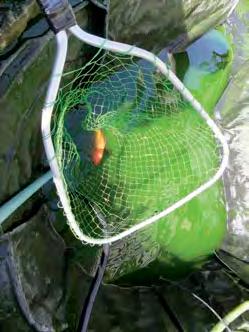

Here’s reassurance for anyone who’s ever crossed the high street to avoid a charity-can rattler—what we buy when we’re there can also help people in need, says Rob Harrison of Ethical Consumer magazine. “Just choose your priorities— equality, the environment or animal rescue—and bear them in mind when you shop,” he says. Because by spending wisely we can help prevent another...

It took a million people to prod fashion companies into signing the Bangladesh Accord, which pledges funds to improve factory safety there. Sixty-three have now endorsed it—including Primark, the only one to offer compensation at the time of going to press. For a list, see labourbehindthelabel.org. raging forest fire Smog from fires clearing land for palm-oil plantations in Indonesia spread as far as Thailand this summer. Often disguised as vegetable oil or stearate, palm oil appears in everything from ready meals to toothpaste, so it’s hard to avoid. It has to be listed as an ingredient from December next year, but until then look for sustainable palm oil or palm-oil-free products (see ethicalconsumer.org). libor-rigging scandal Banking is one of our top three concerns, according to Ethical Consumer Consider a mutual society (there’s a list on financial mutuals.org), which is organised for the benefit of all members.
fountain to keep the water moving, plus a few ramshorn snails to hoover up debris. Duck weed, which looks like cress, is best removed with a net. A green mat on the surface is probably blanket weed, often treated with barley straw. Put 50g/sqm in a net bag with corks to keep it afloat and replace in the spring, or use barley-straw extract. Alternatively, tint the water with Dyofix SGP Blue (£19.95) which starves weeds of light and leaves your pond shimmering. ►
Tax-avoidance scheme Show disapproval by swapping Google for Bing, ordering from individual suppliers online and buying fairtrade coffee from independent cafes. Then sign up to Ethical Consumer’s tax-justice campaign to make sure you’re not the only one paying your dues.

“Hello! My name is Herman. I’m supposed to sit on your worktop for ten days without a lid. You CANNOT put me in the fridge or I’ll die.” If you receive this note, you’ll also have a dish of goo to tend to and pass on—because Herman is a friendship cake. Should he not arrive, dissolve a packet of dried yeast in 55ml of tepid water. Add 150g plain flour and 225g sugar and stir in 275ml of warm milk, and follow this plan.
Day 1: cover with a cloth for 24 hours. Days 2 and 3: stir daily. Day 4: add 1 cup each of plain flour, sugar and milk and stir. Days 5–8: stir. Day 9: feed, as for day 4, then divide into four portions. Give three to friends with instructions and a copy of the note.
Day 10: after surgery, Herman is starving. Add 225g sugar, 300g flour, 160ml cooking oil, 2 eggs, 2 chopped cooking apples, 200g raisins, 2tsp vanilla essence, cinnamon and baking powder, a pinch of salt, and stir. Pour into a baking tin, top with brown sugar and melted butter. Bake at 175C for 45–65 minutes, then tuck in! If you can bear to eat your friend.
what your mortgage provider won’t tell you
● “Mortgage” means “death pledge”, but never fear—your life’s not at stake. If you can’t keep up repayments, I’ll settle for the house.
● That 95% mortgage will cost. You might pay three times more interest than someone who borrows 40%. Interest rates jump at set points, such as 75%, 85%, 90% and 95%, so if you need 76%, see if you can increase your deposit instead.
● I’ve launched a better deal since you applied. Keep an eye on my website because I change rates regularly to tempt new customers. If you find a bargain while the paperwork’s still going through, ask me if you can switch.
● I need to know who’s living with you. Your grown-up children or elderly mum could claim an interest in the house and refuse to budge if it’s repossessed, so you’re unlikely to get a mortgage until they sign a waiver. You’ll also need my permission before taking in a lodger, and don’t even think of renting the house behind my back or you’ll be in breach of contract.
● shame about the fees. That low-interest deal could be pricey once you’ve paid
an arrangement fee of almost £2,000. Search for mortgages charging slightly higher interest but lower fees and do the maths. With luck, you might even find one giving cashback.
● Paying the mortgage may not pay for the house. If you’re one of the 30%–50% with an interest-only mortgage, you’re only servicing the loan. After 25 years, you still won’t own your home unless you’ve saved enough to pay back the amount you borrowed. If you’re worried, contact the government’s Money Advice Service (moneyadvice service.org).
● sorry, you can’t take your mortgage with you. I know I said I’d switch it to your new home, but the Government now says it’s a separate transaction. I’ll have to assess you all over again and if you don’t fulfil my tight lending criteria, I’ll regretfully say no.
● I like keen gardeners. Japanese knotweed can destroy walls and drains, and if it’s rampant you can forget about a mortgage.
● don’t wait until you’ve found your dream home. Agreeing a mortgage in principle before you start looking can give you the edge when you’re trying to buy.
● Give brokers a grilling. Though mortgage brokers can often access special deals, some offers are only available to the public. To make sure you don’t miss out, ask them if they search the whole
of the UK market. Then find out how much they charge and if they claim commission —some do both!
● The Government may bail you out. It can top up a 5% deposit with a 20% loan for new homes and from January will guarantee repayments if you need a large mortgage for property of any age. And if repossession looms, the Mortgage Rescue Scheme can help you hang on to your house. Apply to your local council, but be quick because the scheme is set to end next spring.
● Move to to get on to the housing ladder. First-time buyers there borrow more but pay less of their income towards their mortgage than those in other parts of the UK.


The
medic
the mind-reader medicine With max pemberton

Mrs Doyle is psychic, she tells me. “You’ve got a very strong aura,” she says, staring into the middle distance and waving her hands around my head. It must be my aftershave.
But at two in the morning, I don’t need to hear about my aura. All I want to know is when the pain started. “Right. Anyway, what about your leg pain?” I say, ignoring my own curiosity as to when I’ll win the lottery.
“I should tell you: soon your life will change”
I’m working in the acute assessment unit. This is where some of the patients from A&E are sent for further investigation, so the decision can made as to whether they need to be admitted to one of the medical or surgical wards, or can be sent home. There’s a constant trickle of patients into the unit, each one needing to be seen, and to have a detailed history taken and treatment started. All of this takes time, and the patients just keep on coming. It’s relentless. Yet, by morning, the consultant in charge of acute medicine will expect everything to be done—and if it’s not, there’s trouble.
Mrs Doyle’s legs are slowing me down. She’s been transferred from A&E without a diagnosis. I’m going to have to work out what’s wrong and what treatment to start her on. In her notes it just says “leg pain with rash”.
“I should tell you,” she says, staring into the middle distance again. “Very soon your life will change.” “Does it involve sleeping?” I ask. She stares at me blankly. “No, thought not,” I add.
I don’t know what’s wrong with her legs, but I’ve managed to exclude anything life-threatening, and the Mystic Meg treatment is starting to grate.
The morning comes and with it, the joyless task of the consultant ward round. I know I’m going to get shouted at. “Oh, a classic case,” booms the consultant when he sees Mrs Doyle’s legs. I stare at him. “Erm, yes. Is it?” I say. He narrows his eyes. I’m about to be exposed as a complete medical ignoramus, but Mrs Doyle comes to the rescue. “Phlebitis,” she says. “Pardon?” I reply. “That’s what you said it was last night, didn’t you?” she continues, and then winks in my direction. I said no such thing, so I’m a little perplexed. “Yes, very good. Exactly what I was thinking,” the consultant says to me.
This woman really is a psychic: she read the consultant’s mind. A shiver goes down my spine. Spooky. But then Mrs Doyle whispers to me, “My sister’s a dermatologist. I called her this morning and that’s what she said it was. Our little secret, eh?” And she smiles at me. Not so spooky after all.
After the ward round, I go back to Mrs Doyle to tell her how grateful I am for her help, but she’s already gone. Still, I’m sure she knows.
Max Pemberton is a hospital doctor and author. His most recent book is The Doctor Will See You Now
There are a few variations on this myth. The most alarming, which I remember being told in the playground, was that gum not only takes seven years to digest, but can also stick your intestines together. Happily for all gum-chewers, there’s no need to fear. Although the myth has been around since gum became popular in the late 19th century, it’s completely untrue.

The likelihood is that it originates from a single word that gum manufacturers used in the past: indigestible. While their product contains flavours and sugars that are digestible, the main constituent, gum base, is not: the body can’t break it down. People seem to have assumed that “indigestible” meant it would stay inside the body for a long time. In fact, if swallowed, it simply passes through the digestive tract like any other edibles that can’t be digested—such as fibre. This takes about two to three days. No one knows where the “seven years” bit comes from.
so there’s nothing to Worry about?
Chewing gum wasn’t designed to be swallowed, but there are certainly no medical reasons why it can’t be. It’s also a myth that swallowing bubble gum will result in blowing bubbles from...well, I’m sure you can imagine. ■










If your days out are being ruined by too many visits to the toilet you may be su ering from an overactive bladder.
Over 7 million people in the UK su er too, so you’re not alone.
Luckily there are treatment options available including e ective medications from your doctor.
To find out more about overactive bladder and the help available visit
www.bladderproblem.co.uk
Or call our free helpline on 0800 011
4766













Wash your hands frequently. And, just as important, keep them away from your face. Your mouth, nose and eyes are the vulnerable surfaces where most germ transmission takes place. Wash with plain soap—antibacterial hand washes can strip protective bacteria from your hands and may irritate the skin.
Take a probiotic every day. Probiotics—think probiotic yogurts and yogurt drinks, as well as supplements—don’t just improve your digestion and intestinal health, they also boost your immunity and keep those nasty bugs at bay. A study in the journal Pediatrics reported that children who took a probiotic daily for six months had fewer, and shorter, viral infections.

Drink up: probiotics help ward off bugs
Will mouthwash kill cold germs?
A no. oral rinses may kill bacteria which lurk in your mouth and are suspects in tooth decay and bad breath, but they don’t treat or protect against the dreaded lurgy, we’re sorry to say.
Exercise regularly. Even if you’ve never exercised in your life, there’s still hope: a study in the American Journal of Medicine took two groups of “overweight and obese, sedentary, postmenopausal women” and had one group exercise moderately for 45 minutes a day, five days a week, for a year, while the other group took it easy. By the last three months of the study, the women who didn’t exercise were found to have had three times as many colds as the exercisers. Exercise pays off.
Limit sugar. Eating sugary or refined flour-based foods produces bursts of high

blood sugar in your body, impairing your immune system. Eat plenty of fibre-rich whole foods and cut back on your intake of high-sugar snacks and drinks to keep up your defences against coughs and sneezes.
Don’t smoke. smoking depresses your immune system, makes the tissues in your mouth and lungs more vulnerable to infection, and is associated with more working days lost to sickness. so—in case you didn’t know it already—you really need to kick the nicotine habit if you’re still puffing away (to find out about a new campaign to help people give up smoking, turn the page to see our item on stoptober).
Is the spirit willing but the flesh weak? If so, you’re not alone—about half of all men over 40 suffer from erectile dysfunction at some point. But a new e-book by one of the world’s leading sexual health experts could be just what you need. Dr Ronald Virag’s Erection: the User’s Guide tells men everything they need to know about erections.
The good news is that Dr Virag believes that all men with erection problems can receive an effective treatment and urges them to overcome their embarrassment and seek help from a qualified professional. Another good reason to see the doc? Erectile dysfunction can be an early warning sign of heart disease.
The e-book is available for Kindles, iPads and other e-readers and can be downloaded via Amazon, iTunes and similar sites from £6.79.
soya so good!
Far from being a risk factor for breast cancer, as some experts have suspected, soya has been linked to a reduced risk of recurrence.
Previously, there were concerns about soya isoflavones, a natural compound found in soya beans, which have a weak oestrogen-like effect. (oestrogen has been thought to promote growth of breast-cancer cells.) But, according to cancer epidemiologist Dr Xiao-ou shu at Vanderbiltingram Cancer Centre in tennessee, “it’s much weaker than the actual hormone in the body.”
While that’s good news in itself, even better are the findings of a major study of women who’d had breast cancer for almost eight years. Researchers found those who ate at least 10mg of soya isoflavones a day had a 25 per cent lower risk of recurrence than those who ate less than 4mg a day.

Fighter pilots have to withstand huge G-forces in combat or they risk blacking out. This presented a major dilemma for flight researchers… and they spent a lot of money trying to solve the problem. Their research worked and the pilots were able to fly aggressively.
But they also found an amazing discovery. They discovered that some of the pilots now had lower blood pressure!
Curious researchers sought to find out why this was true. This research led to the development of the Zona Plus® therapy device, where the researchers discovered a unique ‘triggering point’ that multiplies the normal response of isometric handgrip exercise into substantial blood pressure drops.
Early research showed such a large blood pressure drop that doctors didn’t believe the small studies. However, as more and more studies were published they all showed similar results. Finally, after several years of results, the Zona Plus® is becoming accepted around the world. The clinical evidence just keeps getting better, with 15 independently published journal articles showing significant blood pressure drops in 95% of patients.*


“As long as I can remember I’ve always had elevated blood pressure. My blood pressure peaked at very high levels particularly in stressful situations. Being quite an energetic character I took it as God given. I did take my medication, but only reluctantly and not very consistently. Shortly after starting with my Zona Plus Therapy, my blood pressure dropped so quickly that I felt dizzy and had ringing in my ears. It turned out that my body just needed time to adjust to a lower blood pressure. Now my blood pressure is normal, I feel great and take better care of myself. Zona Plus helped me to finally achieve healthy blood pressure levels but also increased my resolve to do something about this disease.” Mr J Blattner
We all know aerobic exercise is good for the heart and typically drops blood pressure a little, but the Zona Plus® isometric therapy done just 12 minutes a day decreases blood pressure by two to three times that much. You can see a video at www.zonahealth.co.uk
The therapy produces physiological changes in the body, including improved endothelial function, nitric oxide production and improved vagal tone. The combined effect causes lower blood pressure.
The therapy takes just 12 minutes a day, five times a week, and your results are guaranteed.**
The Zona Plus® gives you the Power To Change® your life, try it enjoy the benefits.
Try these tips—based on the latest research—for a better night’s sleep
Turn out the blue lights. Eyes wide open? Blame your electronic gadgets. “If we’re exposed to light at night, it shifts the biological clock around,” says Dr Steven Lockley, a US neuroscientist and sleep expert. “And it acts as an acute stimulant, so it alerts the brain.” Light triggers an increase in heart rate, body temperature and brain activity. It also suppresses production of melatonin, the hormone that tells your body it’s time for some shut-eye. We’re particularly sensitive to blue light—the kind emitted by gadgets like smartphones or e-readers. Ideally, switch off your devices an hour before going to sleep, use dim lamps in the evening and sit a long way from the TV.

Have therapy. That might sound extreme, but cognitive behavioural therapy for insomnia (CBTi) is very effective, according to a study at Loughborough University. CBTi has a number of components, including sleep restriction, which— believe it or not—is probably the most effective part of the treatment. Sleep restriction increases your drive for sleep and quickens sleep onset, making for a deeper sleep. for example, if you’re only sleeping six hours a night and have to get up at 7am, try staying up until 1am. After a few nights, move your bedtime 15 or 30 minutes earlier at a time.
The average number of years of life smokers lose as a result of their habit. Are you or someone you love still a smoker but want to give up? Take part in Stoptober, the Department of Health’s new campaign to get people to give up the cancer sticks for 28 days. Why 28 days? Because there’s evidence that if you can quit for 28 days, you’re five times more likely to stay smoke-free. find out more at smokefree.nhs.uk/stoptober.
Pick up good habits. Experts recommend cultivating good “sleep hygiene”—adopting habits that help you nod off. These include having a thoroughly dark room and shunning caffeine after 3pm, as it takes a long time to leave your system. You should also keep your room cool and think again about pre-bedtime baths—they may heat up your body, making it harder to sleep.
Go bright. Expose yourself to as much light as possible during the day so that you sleep better at night; it will train your brain’s day–night pattern. Turn your face to the light when you get up, go for a ten-minute walk to greet the sun and take “light breaks” throughout the day. n

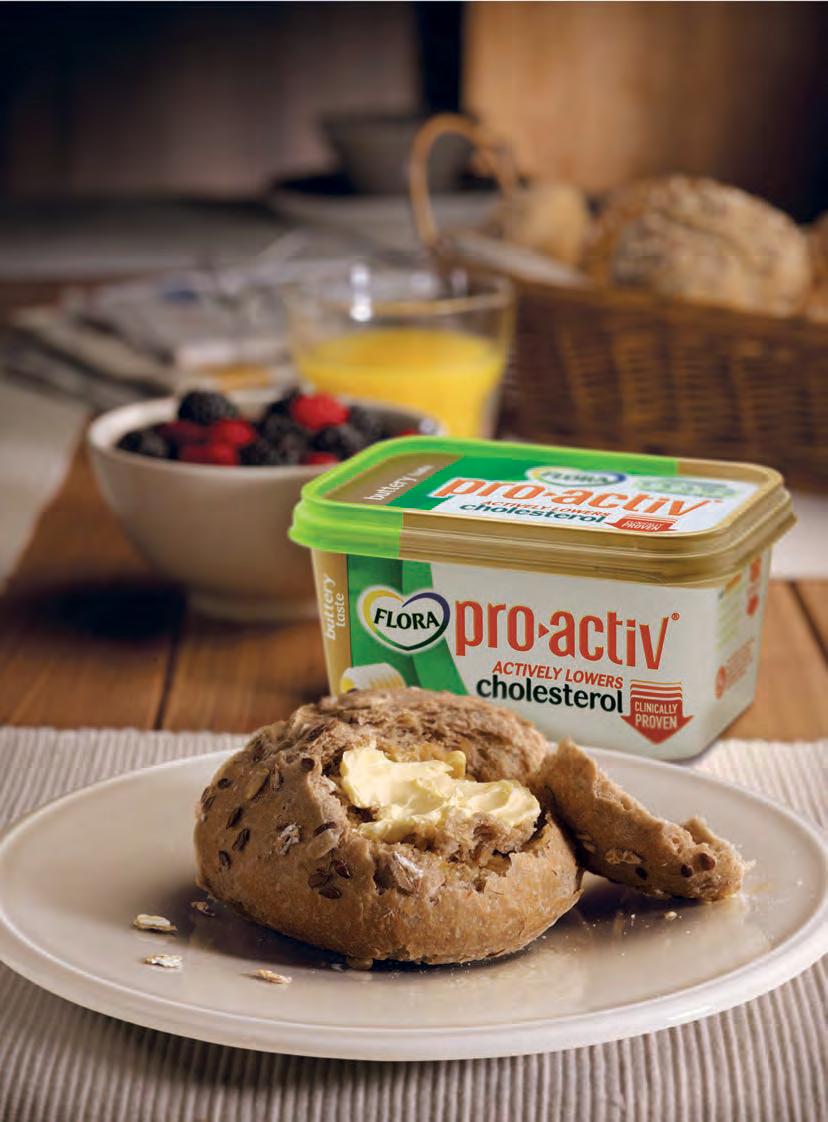
Flora pro.activ Buttery. Proven cholesterol lowering never tasted so good.
Clinically proven to actively lower cholesterol by 7-10%*, with a rich buttery taste and creamy texture. Now, lowering your cholesterol doesn’t mean giving up the tastes you love.
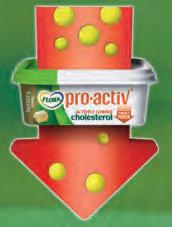
www.floraproactiv.co.uk

QI’ve given information over the phone many times to banks and other companies, and now I’m nervous. How can I differentiate between scammers and genuine service providers?
AThis is a really difficult scenario. We depend on the phone to connect with all those providers, including banks—and particularly when there are problems. Yet when we do, we’re often required to pass on a huge amount of personal information that would certainly be of use to scammers and fraudsters.
The first thing to remember is that you should never give such information to a cold caller. Even if someone claims to be ringing from your bank’s fraud department, ask for a verifiable number to call back on. The general rule is that you should phone the companies rather than accept calls from them.
If there is fraud on your account, the banks will usually reimburse you. But sometimes even the innocent have difficulty proving it—so hold on to receipts and, most of all, try to keep your personal details personal.
Avoid unwanted calls by registering with the Telephone Preference Scheme (tpsonline. org.uk)— it’s free.
Q I owed an £800 debt to a high-street bank that I forgot about. When I remembered, I contacted the bank to find a reference and pay it back, but they told me that nothing is owed. What should I do?
A
What’s happening here is that the bank has probably sold the debt to a finance-recovery company, which then has a certain period of time to retrieve the money. While the debt is with that company, it won’t show up on the bank’s records.
Typically, the recovery agent will offer full settlement of the debt for a half or two-thirds of the original amount owed—but be very careful about accepting. However tempting it is, that settlement will have an adverse impact on your credit rating and impede your ability to borrow for years to come. In a complicated world, it’s easy to lose track of your finances, but if you do keep proper records, you’ll be better protected all round. ■

Donal MacIntyre is an investigative journalist and a former presenter of ITV’s London Tonight. Please email consumer queries to Donal: excerpts@readersdigest.co.uk
BeesarevitaltosomuchofBritishlife: they help pollinate 75% of our food, keep our farms in business and help our gardens, parks and countryside to thrive. Disease, chemicals and disappearing green spaces have all contributed to their dramatic decline in recent years.
The full impact of losing British bees could be devastating. But thankfully, it’s not too late. You can save us – but please act now.
Donate £15 and get your Bee Saver Kit.
Call 0800 581 051 or text Bees to 66777 and we’ll call you.




andSomespeciesofbumblebees,honeybees partssolitarybeesareregularvisitorstomany ofthecountry.Usethishandybeechartandseehowmanycanyouspot.

EarlyMiningBee Andrenahaemorrhoa

BlueMasonBee Osmiacaerulescens

DaviesMiningBee Colletesdaviesanus

GardenBumblebee Bombushortorum

CommunalMiningBee Andrenacarantonica

Fabricus’NomadBee Nomadafabriciana



IvyMiningBee Colleteshederae
White-tailedBumblebee Bombuslucornum








Red-tailedBumblebee Bombuslapidarius

*All texts will be charged at your normal network rate and someone from our team will phone you back free of charge.
Friends of the Earth Trust, a registered charity. www.foe.co.uk
Brown-bandedCarderBumblebee
Short-hairedBumblebee BombusSubterraneus


British wildflower seeds
money With jasmine birtles

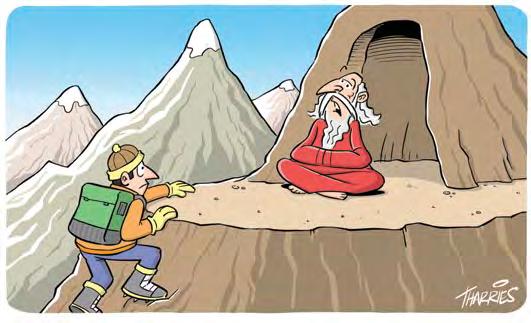
“Pensions? No idea. Have you tried doing the lottery?”
Pensions are so complicated, and yet so important, that for the next few issues we’re devoting part of each Money column to a clear, no-nonsense explanation of the whole tricky business cartoon by tim harries
The state pension age is currently 65 for men and in the process of being increased from 61 to 65 for women. Once you reach that age, you can start claiming. In 2016, a flat-rate pension of £144 a week (in today’s terms) will be introduced. At the moment, it depends on the number of years for which you’ve paid National Insurance contributions (NICs) up to a maximum of £110.15 for 30 years or more. If you’ve paid for fewer years, you get less— although you can pay voluntary NICs to fill any gaps, or use a
spouse’s national insurance record to top up the payments. You might also qualify for the Additional State Pension—and if you’re on a low income, for the means-tested Pension Credit.
Few people can live on the state pension alone, but you can boost your retirement income with a workplace pension. If you work for a large company, you may be automatically enrolled into a scheme. You can opt out if you wish, but this is like turning down free money because you’ll
miss out on contributions from the Government and your employer.
Workplace pensions are either defined benefit or defined contribution (DC) pensions. With a DC scheme, the pension provider chosen by your employer invests the money and the amount you get at retirement depends on your own contributions and how well this investment has performed. Defined benefit schemes have recently been phased out in the UK, but if you’re lucky enough to have one already, your pension will be based on your earnings with that company.
Like workplace pensions, these invest your money in the hope that it will increase over the years—but this time, you get to pick the pension provider. Anyone can save into personal pensions, so they’re ideal if you don’t work or if you’re self-employed.
How much money you’ll have at retirement again depends on how the funds within your pension perform. Most people stick with the default fund but, if you want more control, a self-invested personal pension (SIPP) offers a much wider choice.
The big selling point with a pension is that you don’t pay tax on your contributions. So, as a basic-rate taxpayer, an £80 contribution is worth £100. Or, if you pay the higher rate, you can claim a further 20% as a tax rebate on your self-assessment form. This tax relief is given on contributions up to £50,000 a year or £1.25m (after April 6 next year) over a lifetime. You can also carry forward unused allowances from up to three previous years.
Fancy making money out of other people’s songs? If so, here are some tips.
Noddy Holder of Slade once said that “Merry Xmas Everybody” is his pension. That’s because he and fellow band-member Jim Lea wrote it, and so get royalties every time it’s played. And they wrote other hits that are still played regularly, so the cheques keep coming in, providing a very nice income for them both.

This means a percentage of your annuity is paid to your spouse or civil partner after you die. Usually this is 50%, 66.7% or 100% of the amount you receive. If your spouse or civil partner won’t be relying on your pension income after you die, a single-life annuity could be more appropriate for you.
But royalties can also be sold in advance by the artists. For example, the Royalty Exchange (theroyaltyexchange.com) has been helping artists and investors collaborate since 2011 and has so far held 18 auctions raising nearly £500,000.
Investors bid for a percentage of the royalties for products from songs to new technology. They buy them for a set period,
depending on what the creator is willing to let go.
Songwriters earn royalties every time their music is performed in public—whether via radio, TV, clubs, restaurants, bars, concerts—or online. Other royalties are paid when the music is used in ringtones, streaming, stage productions, print music, toys and other novelty items. So every time a Justin Bieber fan buys an allsinging action figure, you’d be earning cash if you managed to buy into his royalties (which is unlikely by the way!).
Music royalties are very much an alternative investment and relatively new for the ordinary investor. But most have a life span of 70 years or more, so if you can negotiate a long-term deal it could pay you and your children for a good while.
However, it’s not without risk. The money made is not always huge and it can take years to see any real return. With most songs, there’s generally a slow decline in income as singers are forgotten and the records get played less. As with most investments, you need to think through the likelihood of a particular product lasting. Is the song a long-term winner or has its star already started to wane?
Nonetheless, if you already have money invested in more traditional products, putting some in royalties is a pretty interesting alternative!

This monTh’s bargain
Calling all garlic lovers. The Garlic Farm produces everything garlic-related —from fresh bulbs to roasted garlic jam! And now you can get 10% off everything at thegarlicfarm. co.uk (apart from Garlic Lover’s Club membership). Just put our exclusive code RD10 in at the checkout. Valid until October 30,
the one thing you must do this month...
...is save for Christmas. In fact, if you can get all your shopping done this month—including ordering food and drink online—you’ll be stress-free for the festive season. Make a list of presents, work out a budget and then use local markets, charity shops, eBay and online bargain sites to buy the gifts within your price range. If you want to use your credit card, apply now for a long-term 0% balance transfer card that you can switch the debt to. (It usually takes a few weeks to come through.)
Barclaycard now offers 0% for 28 months and Halifax is offering 0% for 27 months so you can really spread the cost with those! ■

fascinaTing facT
The three highest-earning songs of all time:
1. “Happy Birthday” £30m

That Lovin’ Feeling” £20.5m

Jasmine Birtles is a personal finance writer and the founder of moneymagpie.com






Remember when we thought we knew what the world of tomorrow would be like? Nobody really knows what the future holds, but we’re fairly sure that no matter what, you’ll want to be financially secure. Reader’s Digest have an exciting partnership with LV= and that’s just the sort of thing LV= have been helping out with for 170 years. For more information, give their earth-based call centre a ring today. Let

This light dish can be served either as a main or an accompaniment. It’s also a good option for the health-conscious because bulgur is a whole wheat, and a rich source of fibre, iron, protein and vitamin B6.
1. halve, peel and finely chop the onion. heat half the butter in a flameproof casserole, add the onion and fry until it’s translucent.
2. add the bulgur wheat and cook, stirring frequently, for 3 minutes. add the stock, bring it to the boil, then reduce the heat, cover the casserole and simmer gently.
3. while the wheat is simmering, clean and finely slice the
bulgur pilaf with mushrooms (serves 4)
1 onion
115g butter
350g bulgur (cracked) wheat
850ml vegetable stock
225g mixed mushrooms, such as button, oyster and wild small bunch of parsley
1tbs olive oil
salt and black pepper
50g flaked almonds
50g chopped hazelnuts
mushrooms. rinse and dry the parsley, chop finely and set aside.
4. heat the olive oil in a frying pan, add the sliced mushrooms and fry until softened and lightly browned. season with salt and pepper pour the mushrooms and any juice on top of the partially cooked bulgur, re-cover the casserole and leave to continue cooking.
5. add the flaked almonds to the
frying pan and shake them over a moderate heat for a minute or two, then add the chopped hazelnuts and cook both until lightly browned.
6. when all the stock is absorbed and the wheat is cooked—about 10–15 minutes in total—stir in the remaining butter, toasted nuts and parsley. taste for seasoning and serve straight from the casserole. ■





QI’m very envious of my neighbour’s sweet peas, so I’m determined to grow my own. Where should I start?
AFor top-quality blooms, sow sweet peas in deep pots of moist soil-based seed compost during the middle of this month.
Paperback planter: these simple tubes are good for sweet peas
Stand the pots in a coldframe or unheated greenhouse and ventilate well in mild weather. Keep the seedlings in a coldframe until March, when they can be planted out.
Alternatively, you can raise sweet peas in home-made paper tubes. This avoids any root disturbance because the tubes stay in a tray over winter and are planted out intact (the paper will disintegrate).
Q
I’ve been told that this is a popular time to plant wallflowers for next spring. I’m eager to try, but how do I ensure a decent flowering?
A
Many gardeners prefer to buy wallflowers as barerooted plants in autumn, rather than devote space to raising them from seed. Choose compact, branching plants with plenty of rich green foliage. Avoid buying thin, drawn specimens, which seldom bush out after planting, or plants with yellow leaves that indicate starvation or stress from being out of the ground too long.
Before planting, apply a little lime to the planting site unless
your soil is naturally alkaline, as wallflowers are cabbage relatives and are similarly prone to club-root disease. Plant wallflowers immediately or heel in (bury) the roots in a spare piece of ground until you’re ready.
QThe edges of my lawn have become very ragged due to walking and mowing. Is there an easy way to improve it?

AIt’s always best to repair lawn edges in the early stages —otherwise you’ll need to re-cut the lawn, reducing its size. Place a plank on the lawn to act as a guide and cut out the damaged turf using a half-moon edging tool. With a spade, cut horizontally under the turf at a depth of about two inches, severing the grass roots. Lift out the turf and rotate it 180 degrees so the damaged edge is within the lawn and the neat edge is on the outside edge. Firm the turf until it’s just higher than the rest of the lawn; it’ll settle over the next few months.
Fill the gap that’s been caused by the damaged area with a fine garden soil and firm. Sow grass seed and water it in.

l Continue deadheading plants regularly to prolong flowering for as long as possible.
l Treat perennial weeds such as bindweed with a systemic weedkiller.
l Pot up arum lilies for early flowering under glass if you’ve not already done so.
l Remove faded and frosted plants to the compost heap, weed and rake up fallen leaves so the ground is clear for replanting.



Send your gardening questions to excerpts@readersdigest.co.uk
My houseplants suffered with aphids. I sprayed them with diluted Castile soap (2tbs to 2 pints) and they’re still aphidfree months later. It needs to be pure liquid soap, not detergent. ■ Many thanks to Lindsey Stout of Inverness for sending this in.
Email your gardening tips and ideas—with photos, if possible—to excerpts@readersdigest.co.uk. We’ll pay £50 if we use them on this page.
SPANA has made a promise to working animals around the world like Nisu – to treat their injuries, cure their illnesses and ease their suffering. It’s a promise we’ve been working hard to keep for 90 years.
You can help us keep our special promise to animals for the next 90 years by remembering SPANA in your Will. So please, request a free guide and find out how you can give animals like Nisu a future free from pain and suffering.
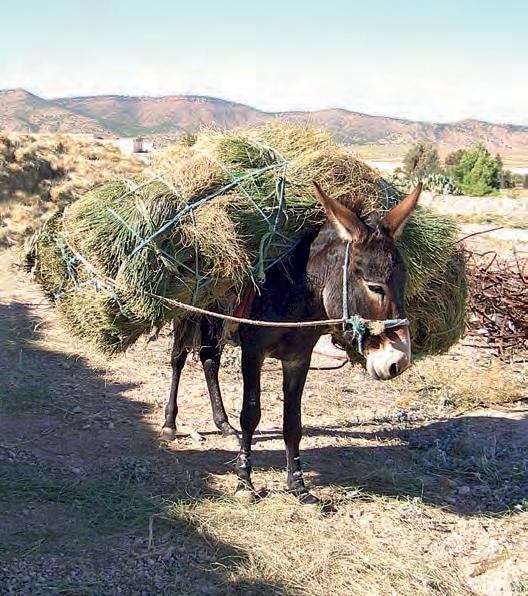
Yes, please send me my FREE guide to gifts


The Jawbone Up bracelet and app tracks how you sleep, move and eat
whopping 150 times a day—on average. What if we used them to handle our health too?
The market’s stuffed with over 17,000 apps offering everything from medical advice to diagnosis and the latest whizz-bang philosophies on healing. Some sound too talented to be true— the uChek app claims to analyse urine samples for 25 medical conditions, and Bloodline aims to find suitable blood donors. Yet a quarter of people using the NHS Choices site (nhs. uk) and app now visit their GP less, and 72% of Americans check the web

before visiting a doctor. Digital-health innovation, accessible to everyone, has game-changing potential. While cutting waiting times and costs (think of the paper savings alone), telehealth is transforming patient care and helping more people live independently. The Department
of Health believes that at least three million Brits could benefit.
Lots of us already use healthmonitoring gizmos such as Fitbit and Jawbone Up, a rubber bracelet that, when synced with an iPhone, monitors sleep and activity. Apps now let us book doctor’s appointments and take charge of our personal health records. The key is knowing which to trust.
In March, the NHS launched its own stamp of approval. The Health Apps Library (apps.nhs.uk) is stuffed with reviewed and approved apps. It aims to provide instant public access to health info. Here’s a selection (you can submit your favourites for testing).
l health Fabric uses your GP electronic health record (EMIS) to help you make informed changes to your lifestyle and create online care plans with your clinician.

l rally round makes it easier for family members and friends to coordinate how they all help a loved one who wants to stay living independently in their own home.
l Zaptag Personal health record puts you in control of your essential details (eg, medication, vaccinations, allergies and weight) to help with your health decisions. Also share it with your network of trusted healthcare providers, if you wish.
l Diabetes risk Checker asks simple questions and then performs calculations to determine your percentage risk of developing Type 2 diabetes over the next ten years.
Are you inspired to share your digital skills with others? Visit go-on.co.uk/ rdigest for more.
Or to find a local taster session, call freephone 0800 77 1234 ab
l PillManager helps you manage your medication by alerting you when you need to take it. It keeps a medication record that can be forwarded to healthcare professionals when it’s time to reorder. Simply send a list of medicines or an image of the prescription directly to a pharmacy or surgery. They can even alert you back via the app when it’s ready.
Did you know you can use the web to make and receive phone and video calls, often for free? Programmes such as Skype make it simple to keep in touch with someone, whether they’re down the road or across the pond. Firstly, you’ll need to install the programme—it might be on your computer, tablet or laptop already. If not, use the search box in your browser to locate it and hit download. To contact people, search for their name before adding to your list of contacts. Both have a camera? Talk and see each other at the same time; you might just need to invest in headphones or a webcam first. ■

Everybody has memories of a Matchbox car: zooming one into the skirting board, perhaps, or treading on it in a darkened room. When we think of toy cars it’s the first name to spring to mind—and with good reason: 60 years ago, Matchbox effectively invented the micro model car.
The brand was the creation of the Lesney company, founded by Leslie Smith and Rodney Smith (hence the name), who were later joined by Jack Odell. Its first major success was a model of Queen Elizabeth II’s Coronation Coach, but the breakthrough came when the only toys Jack’s daughter was allowed at school were ones that could fit inside a matchbox. In 1953 Jack created a car that could do just that, and a signature line was born.

Matchbox, already noted for the realism of its models, had two British rivals in Dinky and Corgi—and, from the US, Hot Wheels, which offered fantasy cars rather than realistic ones. Since the 1970s, though, Matchbox has understood the collectable nature of its vehicles and stuck to what its fans expect.
In the 1980s Matchbox bought Dinky and production was moved out of the UK. In 1997 US giant Mattel bought that company, uniting the Matchbox, Dinky and Hot Wheels names. Matchbox fans feared a drop in quality but, despite the odd hiccup, the name still denotes realistic, highly collectable model cars.
l Remember a favourite toy car—or someone with a great collection? Share your thoughts on our Facebook page.

Renault Captur (from £12,495) The last thing you want is a boring car. And because Renault knows that, it’s come up with the Captur, an “urban” SUV with an appealing blend of practicality and style. A sister car to the Nissan Juke, the Captur has fun looks inside and out; the diesel gets you more than 60mpg; and it has all the clever storage ideas you’d expect from Renault.

According to German colourscience experts BASF, the answer is greens of all kinds. As the world wakes up from the recession, they say, we’ll adopt the life-affirming, positive colour for our motors. Make mine a lime one, please. ■











Send us a photo of your favourite holiday, tell us briefly what made it so special, and if we include it on this page we’ll pay you £50. See address on p4. travel With kate pettifer
One of several milecastles, which usually guarded a gateway, on Hadrian’s Wall near Steel Rigg
Hiking the length of Hadrian’s Wall was a high point for Caroline Miles from West Sussex and her daughter Jennifer
The sight of redundant shipyards may not have been the most salubrious start to our adventure, but we were far more interested in the nearby Roman fort of Segedunum. My daughter Jennifer and I were at Wallsend in Newcastle upon Tyne to begin the 84-mile coast-tocoast walk that follows the path of Hadrian’s Wall from east to west. Walking alongside the River
Tyne, we were able to glimpse part of the industrial heritage of this bustling city, before leaving it and its seven bridges behind. A couple of days later we revelled in the scenic highlights of the path stretching between Chollerford and Steel Rigg, as this section of the wall snakes its way up and over the distant hills.
Milecastles and forts dotted our route and we explored them all, appreciating the beautiful setting of Chesters Roman Fort and its riverside baths, apparently the fort of choice for soldiers stationed on the wall. Contrast this with Housesteads Roman Fort, set on a bleak hillside and battered by torrential rain and driving winds on the day we happened to visit. This only heightened the brooding atmosphere of the fort, which oozed history from every stone —we half expected centurions to march out of the gloom!
Later that day, we could only admire the strength and fortitude
of those Roman soldiers as we shed our hi-tech waterproofs and luxuriated in the comforts of a b&b in the imaginatively named hamlet of Once Brewed.
All too soon, Carlisle was behind us and the countryside of Cumbria gave way to the vast expanse of the Solway Firth and distant views of Scotland. The sleepy hollow of Bownesson-Solway was our journey’s end, and over a celebratory glass of bubbly my daughter posed the question: “Where next, Mum?”
Surely she hadn’t forgotten all those stiles so soon?
Macs adventure has four-night Hadrian’s Wall self-guided walking breaks from £275pp (0141 530 3625; macsadventure. com). Discover the wall at english-heritage.org.uk.
Universityrooms.co.uk
Considering an autumn city break? Find a central base for less with this gem of a website that allows you to book university accommodation during holidays, making cities such as Oxford, Edinburgh and London more affordable. The booking process is simple, with a summary of availability when you hover your cursor over calendar dates. We found rooms from as little as £22, so it’s a website well worth saving.

“Summer” adventures aren’t over yet in Scandinavia—the Mighty Fine Company’s family package of outdoorsy thrills at lakeside Hotel Kalevala in Kuhmo, Finland, runs until October 31. There’s a sightseeing tour by motorboat, a visit to a husky farm and a guided forage for berries and mushrooms thrown in. Return flights, seven nights’ half board and tours start at £1,190 per adult and £763 per child (0845 072 0090; mightyfinecompany.com).


Art comes to Derrylondonderry this month, as the Turner Prize exhibition opens during the city’s year as a UK Capital of Culture. Ebrington Square will host a collection of works by the artists shortlisted for this year’s gong. The “Loving LegenDerry” package at the Everglades Hotel has one night’s b&b, a city tour and more, all from £60pp, based on two sharing (028 7132 1066; hastingshotels.com). Here’s the perfect festive option for those who hate flying. Diamond Rail has a plane-free Christmas holiday on the italian Riviera. The six-day trip departs on December 22: travel to Nice and back by Eurostar and stay across the border at a hotel in Diano Marina. It includes trips to the hilltop village of Dolceácqua and a day’s visit to Monaco and Monte Carlo. From £699pp (0844 544 3808; diamondrailholidays.co.uk). ■
There’s good news and bad news as two leading novelists take on well-known stories

(Hutchinson, £18.99; ebook, £11.70)
In the 1890s, French society was famously torn apart when Alfred Dreyfus, a Jewish army officer, was exiled to Devil’s Island for selling military secrets to the Germans.
Except that he hadn’t. Two years later, Georges Picquart, the head of French intelligence, discovered that the guilty man was a Major Esterhazy. Faced with these findings, though, Picquart’s superiors responded not with gratitude, but with a shameless cover-up that exploited the country’s anti-Semitism and essentially left Dreyfus to rot. Fortunately, as we know, cover-ups have a tendency to backfire.
The story is a gift to any novelist fascinated by the murkier aspects of politics—and Robert Harris (Fatherland, The Ghost) takes full advantage, serving up a perfect read for those who like their literary thrills to come with some immaculately researched history. In lesser hands, the fact that the Dreyfus affair dragged on for so long might mean the book does too. But here the tension is cranked up further with
BY JAMES WALTONJames Walton writes and presents the BBC Radio 4 literary quiz
The Write Stuff
?

name the author Answer on page 132
Can you guess the writer from these clues (and, of course, the fewer you need the better)?
1. During the Satanic Verses fatwa, he had a ferocious feud with Salman Rushdie, calling him “arrogant” and “self-canonising”.
2. His real name is David Cornwell.
3. His most famous character has been played on screen by Gary Oldman and Alec Guinness.
every agonising twist. Picquart, who narrates the book, comes across as an unlikely but genuine hero, whose initial disbelief at his bosses’ reaction turns to a mixture of horror and defiance when he realises they’re out to get him as well.
It must have seemed such a good idea in the publishers’ planning room: commissioning a series of leading novelists to “reimagine” the books of Jane Austen by setting them in the present day. With her sharp eye for the small but significant social distinctions of middle-class life, Joanna Trollope should also have been the ideal author to lead off the project. So why does the result fail so spectacularly?

A Week in Winter by Maeve Binchy (Orion, £7.99) The much-loved novelist’s final book before her death last year. Happily, she went out on a high.
On the Map by Simon Garfield (Profile, £9.99) How the development of map-making has not just helped us to understand the world, but has also changed it. Packed with riveting details.
Consider the Fork by Bee Wilson (Penguin, £9.99)
A thorough history of how we cook and eat, from the discovery of fire to high-tech gadgets. Wilson is also fascinating on the strange business of why different cultures eat what they do.
Most obviously, there’s Trollope’s decision—or possibly her brief—to stick so closely to Austen’s plot. She may replace letters with text messages and throw in the odd iPod and Romanian nanny, but the storyline means the characters never feel remotely modern. Instead, they increasingly resemble the Regency (and non-comic) equivalent of Austin Powers—people who have somehow time-travelled to the 21st century, but who remain wedded to the beliefs of their own era; in this case, that from the age of about 17, a woman must set about bagging herself a rich husband or she’ll starve.
Worse still, this is not merely unconvincing; it also makes the Dashwood family appear so lazy, spoiled and self-obsessed that it almost ends up putting you off the original novel—which really can’t have been the aim.
Letters from the Trenches by Bill Lamin (Michael O’Mara, £9.99) A collection of letters from a First World War soldier, displaying amazing levels of acceptance and good humour —possibly to reassure the folks back home.

Black Roses by Jane Thynne (Simon & Schuster, £7.99) Thynne (left) gives us a thoughtful but fast-moving novel set among the real-life Nazi wives of 1930s Berlin.
From boots full of sweat to human pit ponies: a whole way of life, now gone, is remembered by the people who lived through it

Britain’s Lost Mines is one of those social histories that forcefully remind you of two almost contradictory things. On the one hand, the world that the book conjures up has now disappeared so utterly as to be virtually unimaginable—especially for younger readers. On the other, it was there comfortably within living memory—which is why Chris Arnot is able to get such terrific oral testimony from the people who lived it all. Most speak with pride about mining as “a way of life” and many seem to miss it. Even so, this is by no means a sentimental book; it leaves us in no doubt about either the harshness of the work or how tough miners could be with each other.
It also provides plenty of startling facts. Did you know, for example, that until as late as 1949, boys of 15 acted as human pit ponies, dragging carts of coal away from the face with ropes tied around their waists? Many were scarred for life, yet the last people to do this can only be in their seventies now.
Arnot ranges widely too. The book—complete with beautifully evocative photos on every page—covers not just coal, but slate, tin, iron, salt, lead and gold, all of which were still being mined after the war in various parts of Britain. (The gold was in North Wales.) But even in the sections on coal mining, the material isn’t always what you’d expect. Of course, Arnot does cover the famous coalfields of Yorkshire, South Wales, Durham and Scotland—where the production of football managers was a speciality. (Bill Shankly, Matt Busby and Jock Stein were all Scottish miners once). There’s a particularly touching chapter on Ashington, Northumberland, once known as “the biggest mining village in the world” with a theatre and five cinemas; these days, home to the biggest Poundland that Arnot has ever seen. Yet, we’re also reminded of the colliers of Somerset, Gloucestershire and Kent.

r D e XCLu SIV e : ChrIS arnot’S FaVourIte
noVeLS, PLaYS
anD FILmS
aBout mInInG
Sons and Lovers (1913)
D H Lawrence’s novel about claustrophobic family life in a Nottinghamshire mining community rings so true, partly because it’s his family.
Rape of the Fair Country (1959)
Alexander Cordell’s poetic prose soars above the sordid working conditions in 19th-century Wales. Superior, I think, to Richard Llewellyn’s more famous How Green Was My Valley.
And it’s in Kent that the following extract takes place. On a cold winter’s day, Arnot and a group of ex-miners are in one of the many “heritage centres” to feature in the book, this time in Aylesham: a village built in the 1920s specifically to house miners—or possibly to keep them safely out of sight…
Snowdown Colliery went almost 3,000 feet below the lush fields of Kent and was known to the men who worked there as The Inferno. They would strip down to their underpants or, in some cases, work naked apart from kneepads, belts and boots—boots that had to be emptied of sweat at regular intervals. ‘Underpants were a bit baggy in the days when I started,’ says Jim Davies, 70, who worked in nearby Betteshanger. ‘So we used to work in women’s briefs to keep the old tackle away from catching on anything. The bloke I was having a drink with last night was about 20 stone and his dad was even bigger, but he used to send me down to Marks & Spencer’s to buy his knickers for him.’
Colin Owen is also here with his brother Keith. Both were face-workers at Snowdown and, like the other old miners gathered among the monochrome memorabilia of their former life in another century, both are well muffled as we discuss the hellish heat of their former workplace.

You don’t have to be a genealogist to realise that Davies and Owen are Welsh names. Men from the valleys moved here in numbers during the Depression. Some walked all the way, lacking the price of the train fare. Jim’s father came from a colliery in the Rhondda in 1931 on the promise of a job, a house and a place at fly half in the burgeoning Betteshanger rugby club.
In fact, colliers came from all over the UK. ‘In our road there used to be Geordies, Scots and Yorkshire people as well as Welsh,’ Keith remembers. Like his brother and Jim, he talks like a man of Kent. When it comes to international rugby, however, their hearts belong to the Millennium Stadium, Cardiff.
Why the influx of miners from elsewhere? Because Kent
►
Britain’s Lost Mines: the Vanished Kingdom of the Men who Carved Out the Nation’s Wealth by Chris Arnot is published by Aurum on October 17 at £25
Signs reminiscent of those that greeted the first West Indian immigrants to the UK would go up on Kent boardinghouses and flats-to-let: ‘Nodogsorminers’
had no mining tradition when coal was found there and the coal owners needed men who knew what they were doing.
And what did the incomers find when they arrived? Signs reminiscent of those that greeted the first West Indian immigrants to the UK would go up on boarding houses and flats-to-let: ‘No dogs or miners.’
Having felt rejected by the rest of the county, Kent miners built up strong sporting and cultural competitions within and between their pit villages. Every colliery had its own brass band and male voice choir, pigeon club, fishing club, bowls, rugby, cricket and football club. And more. Most have survived to this day and kept the ‘Colliery’ part of the title. What they haven’t kept, for obvious reasons, is the miner element of the membership. The last colliery closed a quarter of a century ago.
Where there’s muck... members of the Snowdown Colliery Band

Jim now gives talks on the area’s mining heritage
to organisations such as the Folkestone History Society and finds himself booked up for almost a year ahead. ‘They’re really interested,’ he says, ‘but it was rather different when the pits were still open. We played rugby all over the county, representing our collieries, and our hosts would say, “Oh, are you from up North, then?” You might be in Tunbridge Wells, for instance, and people would be completely unaware that there were any pits in the county.’

an D the name o F the author IS … John le Carré. (That famous character was George Smiley— and the feud with Rushdie finally came to an end in 2012.)
The Pitman
Painters (2007)
Lee Hall’s touching play about 1930s miners from Ashington, Northumberland, whose artistic talents were nurtured by the Workers’ Education Association. Visiting Ashington for the book made me realise how much the National Theatre had to tone down the dialect. Locals still make the average Geordie sound like a BBC newsreader.
Brassed Off (1996)
A film tribute to what I call “the Manchester United of colliery bands”: Grimethorpe, thinly disguised here as Grimley. Pete Postlethwaite as the conductor gives an address worthy of Fergie or Busby before the band’s triumph at the Albert Hall, all set against the pit’s closure.
Billy Elliott (2000)
Another Lee Hall work, this one a film about suppressed talent. Billy springs from a mining community at the time of its destruction.

Pam Ayres has been a writer, broadcaster and entertainer for nearly 40 years. Her latest collection of more than 50 new poems You Made Me Late Again! (£16.99) is out now
Puckoon by Spike Milligan
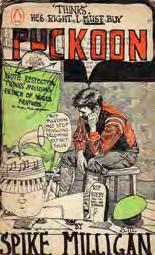
I’d just joined the Women’s Royal Air Force (WRAF) and was feeling homesick when a man, to whom I’d become briefly engaged, lent me this book. He and his friends raved about Puckoon and it had us all convulsed with laughter. The comic descriptions, such as the man in the pub singing with “harp strings of saliva” stretched between his jaws, have stayed with me. I also loved how Spike linked disparate things—the piano player who had “amber beads and a dropped womb”—because the writing constantly took me by surprise. Puckoon taught me how great it was to fall about laughing.
As told to Caroline Hutton

After four years in the WRAF, I did a creative writing course as part of its programme of resettlement. A kind teacher told me I had a good writing style and should read as much as I possibly could. This was one of the books I stumbled upon and I was knocked out by the power of Orwell’s prose. The overweight lady who lay on the sofa in the boarding house, tearing off bits of newspaper and using them to wipe her mouth before dropping them on the carpet, and the “wreck of a monstrous meat pie” she kept in a cupboard, were such vivid pictures. They really gave me something to strive for in my own work.
This book changed my life beyond recognition. It was really more of a pamphlet that I’d printed in Oxford to sell after my performances in the folk clubs in the early Seventies. I’d borrowed £60, had 100 printed and sold them for 60p, but when Radio Oxford gave me a weekly spot I ended up selling 7,000!
This was in the days before Opportunity Knocks made me famous—after that I was able to buy a little house of my own. I remember moving in, shutting the door and thinking, How did this all happen to me? The answer lay within the pages of that modest pamphlet. ■


● How we hear sounds and voices
● Hearing problems and their causes
● Hearing Aid Features and Functions
● An insight into what you should pay
● Private or NHS – what do each provide?
● Finding the best Professional Advice FREE of charge …and much, much more!






They crucified the wrong man - but what about the one that got away?
The story of a lucky but unrepentant crook finding the Apostles a lot harder to impress than the Romans.
“A fascinating what ifwhy has no one written this story before?”



Laugh!
win £50 for every reader’s joke we publish. Email excerpts@ readersdigest.co.uk or go to facebook.com/readersdigestuk
¶ Three professors—a physicist, a chemist and a statistician—go to visit their dean.
Just as they arrive, the dean is called out of his office, leaving the three professors alone. While they’re sitting in his office, they suddenly notice there’s a fire in the wastepaper basket.
The physicist says, “I know what to do! We must cool down the materials until their temperature is lower than the ignition temperature, so the fire will go out.”
The chemist says, “No! No! We must cut off the supply of oxygen, so the fire will go out due to a lack of one of the reactants.”
While the physicist and chemist argue, the statistician runs round the room starting other fires.
“What are you doing?” the other two scream.
“I’m trying to get an adequate sample size,” the statistician replies.
Seen on Reddit
¶ I got a letter in the post the other day. It said, “Do Not Bend”.
I thought, How am I supposed to pick it up?
Comedian Lee Mack
“you have the reputation of being the bad boy of british ballet…”
¶ Jenny sets up her brother terry on a blind date with her best friend Kirsty. Just before the date, Jenny takes Terry to one side and says, “Have fun, but I have to warn you—she’s expecting a baby.”
The next day, Jenny gives Kirsty a call.
“So how did the date with Terry go last night?” she asks.
“He seems like a nice guy,” Kirsty replies, “But I just don’t understand why he turned up wearing a nappy.”
Cheryl Calloway, Newport, South Walescover star e lizabeth mcgovern’s favourite joke? “I can ruin any joke. My family never laugh at my jokes… they just laugh at me trying to tell them!”
¶ Tom’s wife was delighted when he told her he’d finally secured a job in the local bowling alley.
“Ten pin?” she asked.
“No,” replied Tom, “I think it’s permanent.”
Roy Berry, Lancashire
I’ve got some good advice for the camera shy—use coconuts instead Seen on the internet
When i was a kid we didn’t have Game of Thrones. We had to make do with musical chairs

Award-winning comedian Josh Widdicombe is 5ft 6.5in tall, and his favourite TV show is The Simpsons. Each month, he lets us know just exactly what his problem is.

Is there any festival I struggle to get excited about more than Halloween? Possibly summer solstice, but then at least I don’t have to have that thrown in my face every time I walk into a supermarket for the six weeks leading up to it.
Halloween is a childish celebration of everything that’s nasty and wrong in the world, and it blights every
autumn in the UK—much like The X Factor. Even as a kid it wasn’t fun. I mean, how much joy am I really meant to get from bobbing for apples? I don’t want to eat apples at the best of times, and now you’re expecting me to half drown myself to get one?
And on top of this, on the actual night, people are actually encouraged to go door to door begging. Essentially, it’s a night of the year where I have to either go out to somewhere without a front door, or sit still in darkness for the evening.
This is the problem—it’s the one celebration you cannot avoid. At least with Christmas, no one’s going to bang on your door and threaten to egg you if you don’t pull a cracker. Halloween is a true horror.
It’s time for those in stable relationships to feel a little smug. Twitter feed @FirstDateHell recounts the horrors of the dating scene, through a series of gruesome anecdotes:
n “One guy took me to McDonald’s, got a Happy Meal, then played with the soldier toy for ten minutes, pretending to shoot people.”
n “In a restaurant, she said she did a great impression of a fax machine. She beeped loudly while unravelling a napkin from her mouth.”
n “The guy jumped off a wall to impress me and broke his ankle. He then told people for years that I’d pushed him.”
n “The girl turned up and said, ‘You have one hour to impress me.’ I didn’t.”
n “He said, ‘From your photo, I thought you were too good for me. I’m glad to see you’ve got flaws.’ Then he listed them.”
n “She asked to see my iPod. After 20 minutes of just the click of the scroll wheel and raised eyebrows, we parted.”

“Well, well—if it ain’t the limbo Kid…”
phoTos you need To look aT Twice Seen at buzzfeed.com




¶ I was in the pub with my mate Dave when we noticed a group of attractive ladies, so we started dancing near them.
After about ten minutes, I wiped the sweat off my forehead and said, “Dave, I don’t think this is working.”
“Me neither,” he replied breathlessly. “Perhaps we could do with some music.” Seen on the internet
¶ As a child, I had an obsession with Posh Spice.
It cost my mum a fortune in saffron.
Comedian Chris Turner
¶ My brother took being sent to jail very badly. He refused to eat or drink, and spat and swore at anyone who went near him.
We’re never playing Monopoly with him again.
Tracy Davidson, Warwickshire
¶ It’s always hard to explain puns to kleptomaniacs.
They always take things literally.
Seen on Reddit
ladies and gentlemen, please welcome steve hughes
favouriTe one-liner?
“Have
you ever seen someone so Chinese it looks like it hurts?”
–Stewart FrancisfavouriTe gig? I did an amazing preview for my tour a few months ago, in Derby. I had to tell the audience halfway through, “You know, not all audiences are like you.”

steve hughes is on tour with his show While It’s Still Legal. see steve hughes.net.au for details
Sometimes you think the show’s going horribly, but then people come up to you afterwards and say, “Oh, that was fantastic!” And you think, Well, you could have laughed a bit louder when I was on. I was having a bad time.
how do you deal wiTh hecklers?
If you’re going to put them down, especially in a vicious way, the audience better be on your side. There’s nothing worse than a new stand-up who’s dying on stage and decides that the way to save himself is to attack a heckler. It’s a classic mistake. You stand there thinking, Mate, the audience doesn’t like you. He should be saying, “Thanks very much for making this show a little exciting.”
favouriTe Tv show?
I’ve watched I’m Alan Partridge enough to annoy people. I can bore people to death by quoting the scripts over and over again. I was sitting around with some comedian friends the other day and we were swapping favourite lines for hours, like a bunch of geeks.

who’s your comedy inspiraTion?
In the Eighties, I used to watch Billy Connolly, Eddie Murphy and Richard Pryor, but I never had any idea of doing comedy back then. But when Bill Hicks came along, it was like listening to a guy with all my thoughts who was also funny. n
Grab a cup of tea and a biscuit and bend your mind to these six puzzles, ranging from the mildly puzzling to the pen-chewingly fiendish
1. number in the hole
Which number is missing from the x in panel C?
2. connect six
In this puzzle, the aim is to draw lines linking the circles of like colours. Sounds easy? The difficult part is making sure that none of the lines crosses any other.

3. sudoku To win, you have to put a number from 1 to 9 in each outlined section so that: • every horizontal row and vertical column contains all nine numerals (1–9) without repeating any of them • each of the outlined sections has all nine numerals, none is repeated. If you want more of a challenge, try timing yourself too. difficulty HHHH
* Entry is open only to residents of the UK, Channel Islands, Isle of Man and Republic of Ireland aged 18 or over. It is not open to employees of Vivat Direct Limited (t/a Reader’s Digest), its subsidiary companies and all other persons associated with the competition.
4. spot the doG Study the eight dogs above. They may look similar, but only two are identical. Can you spot which two?
D (16 + 17 + 24 + 25) ÷ 2 = 41
C (14 + 15 + 22 + 23) ÷ 2 = 37
B (12 + 13 + 20 + 21) ÷ 2 = 33
A (10 + 11 + 18 + 19) ÷ 2 = 29
1. umbern in the hole: X = 37
2. onnectc


£50 prize question (answer will be published in the november issue)
place a number in the central box by which all the numbers can be divided without leaving a remainder. the number is greater than 1
six: This is one possible solution. 37
The
3. udoku:s If you solved it within: 15 minutes, you’re a true expert; 30 minutes, you’re no slouch either; 60 minutes or more, maybe numbers aren’t your thing.
4. pots the dog: D and F
Answer to september’s prize question:
And the £50 goes to…
Robert Chonzi from Scarborough
win £100 and a Cartoon print

Think of a witty caption for this picture and you could beat the experts at their own game. The three best suggestions will be posted on our website in mid-October alongside an anonymous caption from our professional cartoonist. Visitors can choose their favourite—and if your entry gets the most votes, you’ll receive £100 and a framed copy of the drawing. Submit to captions@ readersdigest.co.uk or the address on page 4 by October 4. Enter and vote online at readersdigest.co.uk/caption. We’ll announce the winner in our December issue. n
Judi dencH on her new film
Philomena and why she’s an everton supporter

This month’s caption by cartoonist Jonesy, “The Johnsons tend to keep to themselves,” was popular with our voters. But reader Stephen Roe more than kept up with the Jonesy— his caption, “When his kids are grounded, they stay grounded,” attracted five times as many votes, thus handing him victory. It’s a familiar tale these days…
scoreboard readers 15 cartoonists 5

•How to stretch your savings
•b ritain’s best music venues
PLus extra puzzles and bonus pages!
In next month’s issue
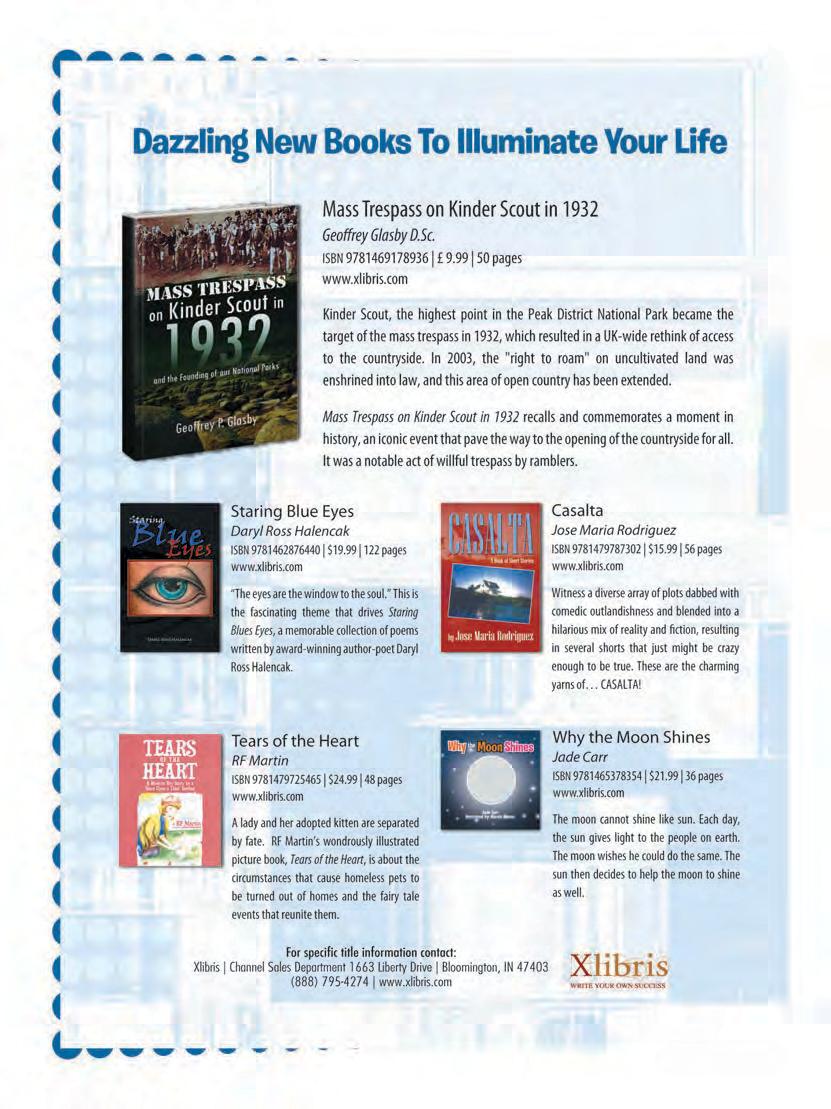


oneWIN of 10 £50 M&S vouchers!visitco.uk/bupareadersdigest.


It’s a great shock to learn that a loved one has dementia. But it’s wise to start making plans – the earlier the better – for coping in the future. Bupa care homes provide the expertise, care and advice to support you throughout your journey
What is dementia? The term describes a set of symptoms, which include memory loss, confusion, di culty in finding the right words. The most common types of dementia are Alzheimer’s disease and vascular dementia. Concerned about someone close? A GP can rule out conditions with similar symptoms. A correct diagnosis means you’ll get correct treatment and support.
Living in

As the needs of your loved one change, specialist care may be the answer – ensuring your loved one is safer and more comfortable. People often find it hard to think of placing someone in care, but this is made easier if they can feel confident that the loved one is in the best place and is being cared for in the ‘right’ way.* You can continue to care by becoming a part of life in a care home – visiting your loved one regularly and getting


For such a tiny island, Jersey has a mighty big heritage. Take Neolithic La Hougue Bie; one of Europe’s finest ‘passage graves’, dating back six millennia. And the magnificently preserved Mont Orgueil Castle, which for over 600 years protected Jersey from French invasion. Or “experience” the island’s extraordinary maritime past in the uniquely interactive Maritime Museum – where you can not only see and hear all about seafaring, navigation and the elements – you can touch and even smell them too! All surrounded by the ever-present remains of the German Occupation. Add Jersey’s mild climate, easy travel from the UK and great-value o ers, and you’ve discovered 45 square miles of history for the taking.



